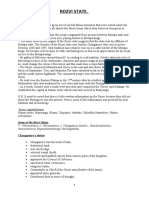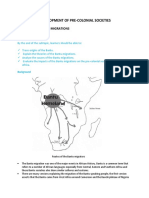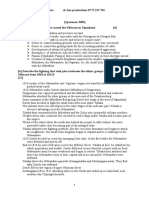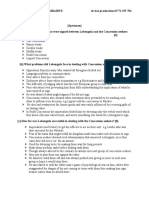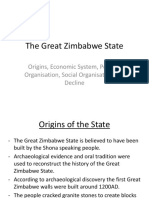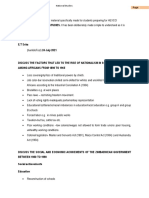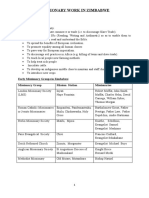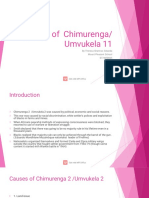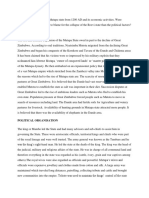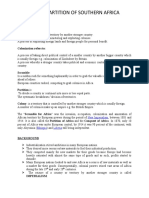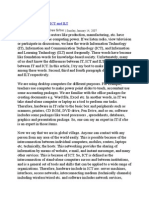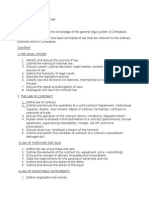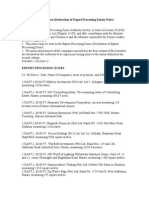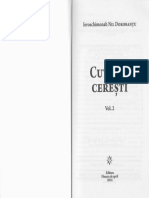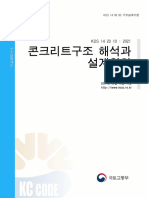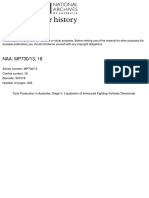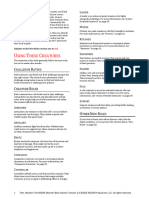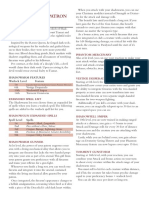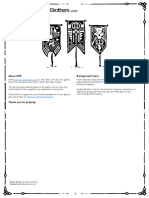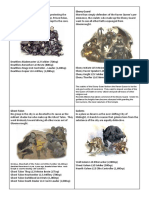Professional Documents
Culture Documents
Nass Notes - History Module1
Nass Notes - History Module1
Uploaded by
Joel GwenereOriginal Description:
Original Title
Copyright
Available Formats
Share this document
Did you find this document useful?
Is this content inappropriate?
Report this DocumentCopyright:
Available Formats
Nass Notes - History Module1
Nass Notes - History Module1
Uploaded by
Joel GwenereCopyright:
Available Formats
A SURVEY OF THE HISTORY OF ZIMBABWE
According to Verrier,
In coming to the heart, the history of Zimbabwe is that of the world class architectural
work, land seizure and settlement, alienation, anger and bravery. Before 1!" no in
Zimbabwe called them #hona, which is a linguistic term and only came to be a$$lied to
those who s$oke the language during the twentieth century.
#imilarly the %debele were not a tribe. &here was a %debele state with sub'ect $eo$le
s$eaking many different languages. (eo$le)s identities in the $re*colonial $eriod derived
from their +embershi$ of chiefdoms and ,ingdoms. &he most these were the ,ingdom
of +wene +uta$a, which the (ortuguese encountered in the Zambezi Valley and its
u$lands, and the ,ingdom of -ozvi +ambos in the #outh*.est.
&here were many $owerful chiefdoms, such as /hief +utasa)s /hiefdom of +anyika in
the east. In the nineteenth century +zilikazi led his warriors into the .est of Zimbabwe
and created the %debele ,ingdom, which was inherited by his son 0obengula. &hese
states and statelets have ins$ired many Zimbabwean writers looking back to a $ast of
inde$endent African citizenshi$. &here were $owerful religious figures in $re*colonial
Zimbabwe. In the +ato$os mountains of the #outh*.est there 1as there still are2 cave*
shrines of the 3igh 4od, +wali where $ilgrims went to ask for rain, were given seeds
$lant, and the voice of 4od from the rocks.
In many other country there were 1as there still are2 s$irit mediums* both men and
women who were $ossessed by rain 5making s$irits or by the s$irits of $ast ,ings and
/hiefs. #uch figures a$$ear in many Zimbabwean novels. &wo in $articular have
achieved great fame in modern Zimbabwe and have given their names to streets and
buildings. &hese are male mediums, ,aguvi and the female medium, %ehanda, who were
both hanged by the British after the 1!6 u$rising against the white settlers. &he %ehanda
s$irits was a rainmaker and a $rincess, of the +utata ,ingdom. 3er 1!6 mediums is
Zimbabwe)s great heroine and reference to her a$$ear in many novels.
&he im$ortance for Zimbabweans of the +uta$a #tate and the %debele ,ingdom, of
4reat Zimbabwe and the %ehanda mediums, is all the move in tense because the white
con7uerors and rulers of the county denied, traduced or mocked this $ast. .hite
governments denied that Africans had built 4reat Zimbabwe, called +zilikazi a des$ot
and %ehanda a witch. .hite missionaries and traders had reached Zimbabwe in the mid
nineteenth century and were later based at Bulawayo. (ressure u$on the %debele ,ing
increased as re$orts s$read that +atebeleland was rich in gold. &he (ortuguese from
+ozambi7ue, the Afrikaaners from the &ransvaal, the 4ermans, the British and /a$e
/olony were all interested in controlling the gold*fields.
In the end the im$erialist*ca$italist /ecil -hodes, managed through bribery and trickery
to e8tort a 9concession: from 0obengula. ;n the basis of this concession he then
obtained a -oyal /harter for his British #outh Africa /om$any. &he 7uestion was how to
make the /om$any effective inside Zimbabwe. -hodes contem$lated a commando raid
which would seize Bulawayo and kill 0obengula. In the end he decided to outflank the
%debele #tate. In 1!" he sent in a (ioneer /olumn from the /a$e to wind its way east of
the %debele and to settle in the %orth*<ast. In this way +ashonaland was occu$ied and
=ort #alisbury established.
4old was not discovered in $ayable 7uantities and the /om$any shares fell. In 1!>,
therefore, -hodes decided that +atabeleland must be invaded. A $rete8t was devised?
British troo$s advanced north from Botswana and 0eander @ameson led the Victoria
/olumn of $ioneers in an advance from east.
@ameson)s men, de$loying their devastating machine guns, moved down the %debele
im$is and seized Bulawayo. 0obengula fled north and disa$$eared into the bush. &he
com$any encouraged its $ioneers to fan out into the countryside to search for gold. It
raided %debele cattle and took them into the 90oot ,raal: in Bulawayo. Aisregarding
%debele indignation, @ameson took most of the /om$any (olice with him on the ill*fated
@ameson -aid into the &ransvaal in 1!B. #eizing their o$$ortunity, many of the %debele
rose u$ against the whites in +arch 1!6, killing almost all of the settlers in the outlying
areas. In @une 1!6 many #hona /hiefdoms also rose in revolt.
&he 1!6 risings are known as the 9=irst /himurenga: &he #econd /himurenga being the
guerilla .ar of the 1!6"s 5 C"s. &he risings were su$$ressed with great brutality. &he
%debele kingshi$ was abolished? other /hiefs became salaried functionariesD s$irit
mediums and +wali $riests were arrested and s$ied u$on.
#vikiros like %ehanda and ,aguvi were a$$rehended and handed to 3er +a'esty)s /ourt
in +arch 1! alongside Zindoga, 3wata and 4utsa for the alleged murder of one 3enry
3awkins (ollard a white commissioner who resided near +azoe and terrorized blacks in
that district. &he case was entered as 9&he 1British2 Eueen against %ehanda. &he
e8ecution $rocess was authorized by the British 3igh /ommissioner for #outh Africa,
one a. +ilner and endorsed by the British Im$erial #ecretary on F +arch 1!. =urther
e8ecutions were again to take $lace in the subse7uent months of 1! with F1
condemned %debele fighters being e8ecuted in may 1! alone. &hese included among
others, 4eneral +agwegwe, +kwati, +afuyana etc. In +ashonaland, the ame bloody
orgy continued, with leaders of resistance as +ashonganyika, +uzambi, maremba,
%dowa, Zvindembo, 4unduza, +venuri, +ashindu, +anyongori, /hiriseri and /hief
4utu getting e8ecuted in the same violent way.
In the case of /hief /hingaira, the civilized British savagely and bizarrely deca$itated
him and carried his head to Britain as a tro$hy for their museum. &o this day that head
has not been recovered for a decent burial. &o those who sought cover in caves, they were
dynamited and their cro$s were torched to break their resistance against violent im$erial
encroachment. &he years that followed the =irst /himurenga, witnessed hunger and
starvation artificially caused by the invaders but even that did not break the s$irit of
resistance and sooner or later Africans would regrou$ and fight again.
The Consolidation of White Settler Rule and the Marinali!ation of Bla"#s
After the blacks had been brutally su$$ressed in 1!, there was a great need to
constantly monitor their activities such that what had ha$$ened in the =irst /himurenga
could not ever ha$$en again es$ecially if one takes into account the large numbers of
white casualities which were around F"" deaths and several in'ured. &o com$lement the
efforts of the white state machinery, various Acts were $ut in $lace to deal with issues of
governance. =irstly, the 1! %ative -eserve ;rder in /ouncil Act was enacted with the
sole $ur$ose of removing all traditional /hiefs who were anti*colonial rule from their
$osts. &hey were to be re$laced by white colonial administrators. &he Act also created
what was later to be called the African -eserves. In 1!"> there came the 3ut &a8 Act to
beef u$ the <uro$ean coffers. &hus, the nearer the African 3omestead as to a white
settlementD the more it attracted in ta8. In 1!1F, came the Aog &a8 and 0and bank Acts.
&he latter was meant to cushion the white farmers from the vagaries associated with
farming. .hite farmers were to be given loans, free seed, free fertilizer and above all
were offered free tillage services for five 1B2 years after which, they could start $aying
back loans. In 1!1C, was created the <uro$ean (roduce Act which made it mandatory for
whites only to $roduce to fetch more money at the e8$ense of their black counter$arts.
In 1!FB, there was established the +orris /arter /ommission whose sole res$onsibility
was to divide the whole country into agro regions based on the rainfall $attern. &he
results of this /ommission necessitated the enactment of the 1!>" 0and A$$ortionment
or <8$ro$riation Act. &he Act made it mandatory that, all blacks were to be forcibly
removed from regions 1,F and >. At that time 11!>"2 whites numbered only about B" """
whilst blacks were over a million. Aes$ite this, whites were to share between themselves,
G! """ """ 1G! million2 acres of fertile soil while blacks were to share F million acres of
land in regions G and B. In 1!>1, was enacted the +aize /ontrol Act which made it an
offence for a black farmer to $roduce more than F tonnes of whatever $roduce.
&he 1!>G Industrial /onciliation Act was enacted to bar blacks engaging in skill labour
although it was later rela8ed to allow blacks to venture into teaching, nursing and
agricultural e8tension services. &he same year also saw the enactment of the -acial
Aiscrimination Act which made it an offence for blacks and white to share social
amenities like toilets, hos$itals, schools, bars and hotels 'ust to mention a few. #uffice to
add here that blacks were not allowed to stay in lowdensity suburbs and were forbidden
to vote. &hus, it was im$ossible to become a black +ayor, /ouncillor, +inster or
(resident. <ven at work $laces, the highest office that could be occu$ied by a black
$erson was that of a bassa boy or foreman in the industry. In the Army, the highest rank
for a black $erson was that of a cor$oral whilst in the (olice =orce, it was the rank of a
#ergeant.
In 1!B1, was enacted the 0and 3usbandry Act which made it an offence for a black
family to own more than five 1B2 herd of cattle and acres of land. In 1!6B, was enacted
the &ribal &rust 0and Act whilst the 0and &enure Act was $ut in $lace in 1!6!. &he 1!6!
Act divided the country une7ually on racial lines as it gave GB million acres of the best
land to less that a 7uarter of a million whites, while five and a half million blacks were
given an e7ual area of land in the least fertile regions with the lowest rainfall. It also
restricted movement into areas reserved for one race by members of another race e8ce$t
by s$ecial $ermit. &his unfair division of land was a ma'or theme in African %ationalism.
The Rise of $ationalis% and the &rose"ution of The Se"ond Chi%urena
+eanwhile, after the colla$se of traditional resistance in 1!, and the seizure of $olitical
$ower by the re$resentatives of the white settlers in 1!F>, /om$any rule had become an
anachronism. In the 1!F> referendum the white settlers were offered a choice between
'oining the Hnion of #outh Africa and res$onsible self*government. &hey chose the latter
and between then and 1!C!, -hodesia was governed by a #ettler /abinet res$onsible to a
#ettler (arliament. African intellectuals felt betrayed by the $olicies of segregation
enforced in the 1!>"s and beyond.
4radually African $rotest movements emerged. &he most significant movement in the
$eriod between the two .orld .ars was the growth of $owerful trade unions, es$ecially
the African -ailways .orkers Hnion and the -eformed /ommercial and Industrial
.orkers) Hnion, which mobilized the growing urban $roletariat on non*tribal and non*
regional lines. Accelerated white settler immigration, and deteriorating #ocio*economic
conditions in the $ost*war $eriod brought issues to a head. Bulawayo, then the ma'or
industrial city, became the centre of African trade unionism and $olitics. In 1!GB, the
African -ailway .orkers) Hnion struck first by organizing a general strike which brough
this vital communication network to a stand still from +utare 1Hmtali2 in -hodesia to the
Zambian /o$$erbelt.
In 1!G broader demands were made in a country*wide general strike that brought all
/ommercial and industrial activities in the ma'or cities to a stand still for a week. &he
cam$aign for the establishment of the =ederation of -hodesia and %yasaland by the
white settlers in 1!B lulled the workers a little with a $romise of reforms, but they soon
reorganized and launched the /ity %ational Iouth 0eague in 1!BB. As the name indicates,
the 0eague re$resented the young $roletariats in the growing cities. In the late 1!B"s, the
;ld +oderate /ongress was re$laced by a much more radical successor. ;n #e$tember
1F, 1!BC, the African national /ongress was reborn, and it 7uickly mobilized the rural
$easantry whose livelihood was made $recarious by the combined effects of the land
A$$ortionment and native land 3usbandry Acts. &he late @oshua %komo was a leading
figure in these trade unions and $olitical develo$ments. #ome white -hodesian demanded
outright re$ression. ;thers ho$ed for accommodation. 4arfield &odd as (rime +inister
between 1!B> and 1!BC o$ted for greatly accelerated African education and $romises of
$artnershi$. .hen &odd was overthrown by his /abinet colleagues for going too fast, all
changes of com$romise vanished.
&he #outhern -hodesia African national /ongress #-A%/ was banned in 1!B! by
Aavid .hitehead and hundreds of Africans thrown into 'ail. A host of re$ressive laws
were introduced against the nationalist movement to add to those already in e8istence.
Among them were the native Affairs Act, Hnlawful ;rganizations Act, (reventive
Aetention Act all in 1!B!. &hese were soon followed by the <mergency (owers Act and
the 0aw and ;rder +aintenance Act of 1!6".
&he sustained re$ression of the African $eo$le by the settlers convinced the nationalist
leadershi$ that little could be gained by $ressurizing the .hitehead 4overnment. Instead,
they ado$ted the strategy of forcing Britain to im$lement the $rocess of decolonization,
which it had initiated in other $arts of Africa. &his strategy failed to work. &he national
Aemocratic (arty 1%A(2 was launched 1n @anuary 1!6" to re$lace the banned #-A%/.
@oshua %komo was elected (resident and among his lieutenants were %dabaningi #ithole,
3erbert /hite$o, -obert +ugabe, Bernard /hidzero, 4eorge #ilundika, @aison +oyo,
0eo$old &akawira, @osiah /hinamano and Aumbutshena among others.
&he %A( was banned in 1!61 and was re$laced by the Zimbabwe African (eo$les Hnion
1ZA(H2 in Aecember 1!61. ZA(H was banned in #e$tember 1!6F and there was
increased frustration within the nationalist movement. &his led to the formation of the
Zimbabwe African %ational Hnion 1ZA%H2 in August 1!6> under the leadershi$ of
%dabaningi #ithole. &his was also banned in 1!6G. &he whites failed to realize that
nationalism, after all, involves imagining a $ast and a future in order to change the
$resent. Inevitably the nationalist literary imagination focused es$ecially on the glories of
the African $ast and on the o$$ressions of colonialism. By 1!6G most of the nationalist
leaders were either in $rison, detention or e8ile. 3owever, numerous incidents of
sabotage followed in the early months of 1!6G. A grou$ of 1"" blacks under 4eneral
/hedu calling themselves the Zimbabwe 0iberation Army organized sabotage in some
rural areas of the country. &o gain credibility, ZA%H launched the first guerilla unit, the
/rocodile 4rou$ in 1!6G as it attacked a $olice cam$ and killed a white farmer in
+elsetter 1/himanimani2. +eanwhile, the emergence of a more militant African
nationalism created a backlash in the white community leading to the election in
Aecember 1!6F of the -hodesia =ront 1-=2 (arty, of which Ian #mith became leader in
1!6G after taking over form .inston =ield.
&he reactionary -hodesia =ront issued a Hnilateral Aeclaration of Inde$endence 5 n1!6B
1HAI2, throwing off remaining restraints from Britain, intensifying segregation and
undoing what advances had been achieved by $artnershi$. &here was no course o$en to
African nationalists but to $re$are for guerilla war. It was a long drawn out $rocess. &he
nationalists resolved that they were to be their own liberators through direct confrontation
as a state of emergency 11!6B2 was declared giving license to the -hodesian #ecurity
=orces to kill any African they sus$ected to be o$$osed to them, take $risoners and seize
the little $ro$erty of the $easants, including goats and shee$ without any com$ensation or
recourse to the law.
+eanwhile, the internal $olitical situation in -hodesia by 1!6>, had forced the
nationalists to seek foreign bases for the military training of young black cadres as ZA%H
and ZA(H armed wings were to be known as the Zimbabwe African %ational 0iberation
Army 1ZA%0A2 and Zimbabwe (eo$le)s -evolutionary Army 1ZI(-A2 res$ectively.
<arly +ilitary &rainings for these cadres were offered in friendly countries like <gy$t,
/uba, /hina, 4hana, &anzania and Zambia 'ust to mention but a few in $re$aration for
the armed struggle $ro$er. &he armed struggle began in 1!66 when the -hodesian
#ecurity =orces clashed with a small grou$ of guerillas in #inoia 1now /hinhoyi2, with
the result that all C members of ZA%0A were killed.
In August 1!6C, ZI(-A formed an alliance with #outh African %ational /ongress
1#AA%/2 armed wing Hmkhonto .e #izwe, de$loyed for four grou$s of F" guerillas
into -hodesia. &he result was fiasco as a series of bitter running battles took $lace from
1> August in the .ankie Aistrict resulting in the loss of many guerillas. #ome of the
guerillas managed to esca$e back into Zambia while others fled into Botswana.
Immediately, there were air s$ace violations of Zambia by the -hodesian =orces 1-=2.
0eaflets were dro$$ed in the Zambezi Valley calling on the guerillas to surrender or die.
Aes$ite this, ZI(-A and Hmkhonto .e #izwe de$loyed another larger contingent of
about 1B" guerillas but again were re$ulsed.
&hese events $rom$ted the #outh African 4overnment to send troo$s to -hodesia to
assist the -hodesia =orces track down the insurgents. &here was introduced the 0aw and
;rder +aintenance Amendment Bill by the -hodesian 4overnment on C #e$tember 1!6C
which $assed without dissent on the 1!
th
of the same month. &his Anti*Insurgency Bill
made the death #entence mandatory for $ersons found with arms of war unless he could
$rove beyond reasonable doubt that he had no intention of endangering the maintenance
of law and ;rder in -hodesia or a neighbouring country. In retros$ect, these incursions
were virtually suicidal hence remedial measures were to be found.
A vital role was $layed by the =ront for the 0iberation of +ocambi7ue who were fighting
the (ortuguese. In late 1!6! and early 1!C", the Zimbabwe nationalists met the =relimo
leaders and agreed to coo$erate in carrying out military o$erations. =relimo which had
develo$ed considerable e8$erience in guerilla warfare was able to train Zimbabwean
4uerillas in the art of $olitical mass mobilzation. &his move forced the -hodesian =orces
to conduct combined military o$erations with their (ortuguese counter$arts in
+ocambi7ue from 1!6 onwards. Aes$ite this, the mass mobilization was $racticed by
the insurgents with great success starting Aecember 1!CF when guerilla attacked Alterna
farm in /entenary. &he situation a$$eared brighter due to the colla$se of the (ortuguese
Authority in +ocambi7ue, Angola and 4uinea Bissau in A$ril 1!CG after the successful
+ilitary /ou$ in (ortugal headed by 4eneral #i$onola against #alazar then (rime
+inister of (ortugal.
3owever, this was not to be as @ohn Voster then #outh Africa)s (remier, came u$ with the
AJtente (olicy whose main them was to stifle the guerilla war effort in -hodesia. &his
was e8acerbated by /hite$o)s death on 1 +arch 1!CB in Zambia in a landmine incident.
It has to be remembered that when most %ationalists were arrested after the banning of
their (arties, an e8ternal $olitical wing known as Aare -e /himurenga was established to
s$earhead the $rosecution of the armed struggle. &he late 3erbert /hite$o was a$$ointed
/hairman of this establishment in 1!6. #oon after the 1!CFK> 4uerilla offensives, the
-hodesian 4overnment in retaliation, forcibly drove the blacks into (rotected
VillagesK,ee$s to deny them from feeding the guerillas albeit with little success.
+eanwhile, both ZA(H and ZA%H had been rocked by internal s7uabbles in the early
C"s and 1!CG res$ectively. Hnder the influence of the ;AH 0iberation /ommittee, the
two $olitical $arties 1ZA(H and ZA%H2 were forced to unite. &he situation was rectified
in Aecember 1!CB when the two $arties formed a combined armed wing to be called the
Zimbabwe (eo$les) Army 1ZI(A2 with the blessing of both %yerere and +achel. &hus
guerilla warfare gathered momentum in early 1!C6 as ZA%0A guerillas intensified its
o$erations in &ete, +anica and 4aza (rovinces whilst ZI(-A intensified its o$erations in
the %orthern and #outhern =ronts. ZA%0A)s &ete, +anica and 4aza (rovinces were
divided into sectors whilst ZI(-A)s =ronts were divided into -egions. +eanwhile the
-hodesians killed thousands of guerrillas and refugees in bombing raids on cam$s inside
+ocambi7ue and Zambia e.g %yadzonia, /himoio, and &ete in +ocambi7ue, =reedom
/am$, +ulungishi and /hifombo in Zambia. But gradually the guerillas began to e8ert
$ressure on the -hodesia #tate. &he turning $oint came when ZA%0A guerillas began to
o$erate from +ocambi7ue in themed 1!C"s. By 1!CC, -obert +ugabe had achieved
control of both ZA%H and ZA%0A. &housands of young guerillas were infiltrating the
country from +ocambi7ue. +eanwhile in Zambia, @oshua %komo was unchallenged
leader of ZA(H and of its army ZI(-A. .ith #oviet backing, a$art from guerilla
warfare, he had manned a conventional air tank and artillery assault on -hodesian towns.
&he #mith regime was under $ressure from its ally, #outh Africa. Ian #mith tried to
undercut the guerillas by coming to terms with moderate African leaders in an Internal
#ettlement. In A$ril 1!C!, Bisho$ Abel +uzorewa was elected as the 0eader of
Zimbabwe -hodesia. But his regime was recognized by noone. 3e and #mith were drawn
into negotiations with %komo and +ugabe at 0ancaster 3ouse at the end of 1!C!.
%one of the $arties involved got what they wanted from 0ancaster 3ouse but all believed
that they could win the inde$endence electionsD +uzorewa thought so because of his
large scale financial su$$ort and his electoral victory in 1!C!, %komo thought so because
when nationalist $arties were banned in 1!6G his ZA(H had en'oyed more countrywide
backingD +ugabe also thought so because he had so many young guerillas in $lace.
+ugabe)s $rediction was the most accurate. In the 1!" elections, his $arty won two
thirds of the votesD %komo won a third and +uzorewa was routed.
-ecalcitrant whites emigrated to #outh Africa, Australia, %ew Zealand or to Britain
$roviding an audience for genre of war reminiscences and war novels which em$hasized
the victories of the -hodesian fighting men and their betrayal by the $oliticians and the
British. &his was countered within Zimbabwe by a literature of the war which was a first
trium$halist but which gradually faced u$ to the horrors. It soon became clear that
internal violence was not over and that there were to be horrors of inde$endence too. A
bare two years after inde$endence there was a civil war in the +idlands and
+atebeleland $rovinces. <8*Zi$ra dissidents fled into the bush. &he Zimbabwean army
and the newly formed =ifth Brigade were de$loyed to deal with the situation for the
coming five years.
&he violence in .estern Zimbabwe came to end with the Hnity Accord of FF Aecember
1!C. +eanwhile between 1!" and 1!!", the ZA%H (= 4overnment embarked on a
cam$aign to redress the colonial imbalances that had been in e8istence since 1!". A lot
of social, $olitical and economic develo$ments took $lace es$ecially during the =irst ten
years of inde$endence. &he government de$loyed troo$s to assist =relimo against the
#outh African s$onsored -<%A+; from 1!F to 1""F. &he whole #AA/ region was
sub'ected to the whims of the A$artheid #outh Africa)s destabilization $rocess as the
$ro8y forces like H%I&A, -<%A+;, #H(<- ZA(H wrecked this, the A$artheid #outh
Africa conducted raids in neighbouring countries in $ursuit of liberation movements like
Hmkhonto .e #izwe and (A/ of #outh Africa.
In 1!!1, after the colla$se of the former H##-, the Zimbabwean 4overnment was
sub'ected to <#A( in the same manner other countries had been affected. &his brought a
lot of suffering to the ma'ority $oor Zimbabweans leading to food riots in @anuary 1!!.
In August 1!!, the Zimbabwe Aefence forces were de$loyed to A-/. In =ebruary F""",
a /onstitutional -eferendum was conducted and the %o vote succeeded es$ecially
against the %o /om$ensation for land /lause and on the Hndiluted (owers of the
(resident. +eanwhile on the $olitical front, a &rade Hnion ins$ired o$$osition $arty 1the
+ovement for Aemocratic /hange2 was formed in #e$tember 1!!! and the following
year, it $artici$ated in the @une F""" (arliamentary <lections. &he ruling $arty ZA%H (=
lost BC seats to the +A/ and it won the remaining seats.
+eanwhile, in reaction to the %o Vote of F""", the .ar Veterans and the landless
$easants occu$ied most white owned farms to launch what was later to become &he &hird
/himurenga. &his era has seen almost >"" """ blacks being given land to economically
em$ower themselves.
&his was is being fought or waged on all facets of the social strata that is economically,
legally, $olitically and $sychologically. &he most affected however have been the
generality of the $eo$le due to economic sanctions which the Zimbabwe 4overnment has
been sla$$ed with by the British, Americans and the <uro$ean Hnion as they try to fi8 the
ZA%H (= government for taking land from their kith and kin. &he Business /ommunity
in the country has also ganged u$ with the .estern .orld in this economic or $olitics of
the stomach. &o alleviate this situation, the ZA%H (= 4overnment has come u$ with
agricultural led economic blue$rint which has been dubbed the &en (oint (lan to be
orchestrated within the realms of the %ational <conomic -evival (lan 1%<-(2
Readin 'ist
1. ,riger %orman Zimbabwe)s 4uerilla .ar, (easant Voices
African #tudies #eries C" /ambridge,1!!F
F. +c0aughlin @anice ;n the =rontline /atholic +issions in Zimbabwe)s
0iberation .ar.
3arare Baobab Books, 1!!6.
>. +orris +ichael &errorism
/a$e &own, 3oward &immins, 1!C1.
G. Astrow Andre ZimbabweD A -evolution that 0ost its .ay
Zed (ress, 0ondon, 1!>
B. 0ane +artha &he Blood that made the body go
&he -ole of #ong.
&oetr( and dra%a in Zi%)a)*e+s War of 'i)eration ,-../,-01
Illinois 2&h3 Thesis4 3e"e%)er ,--56
Zi%)a)*e Histor( and Heritae
&re/Colonial States / an O7er7ie*
Zimbabwe)s $re*colonial history is largely characterized by the rise and e8istence of four
ma'or states, three of them #hona and another one of %guni origin. &hese were 4reat
Zimbabwe, +uta$a, -ozvi and the %debele #tate. A brief survey of the history of these
states reveals a lot of similarities in terms of their economics, religion, $olitical and even
military systems.
4reat Zimbabwe was the earliest state to emerge during the Iron Age around 1F"" AA.
All the states had develo$ed centralized $olitical structures which were centred on the
absolute authority of the rulerKking. &his ruler was given the title +unhumuta$a in the
+uta$a #tate, /hangamire in the -ozvi, mambo in the 4reat Zimbabwe and %kosi in the
%debele.
.hatever the title, the rulers in all the $re*colonial Zimbabwe states seemed to have
similar functions. &hey acted as the chief 'ustices, 3igh $riests and commander in chief
of their armed forces. In all these states the king had the final decision on any matter but
this was not necessarily dictatorshi$. &hese rulers infact, oftenly consulted s$ecial bodies
of advisors called the dare in #hona states and the Hm$hakathi in the %debele states.
&hese advisory councils were mainly constituted of sub*chiefs and senior members of the
aristocracy.
&he %debele because of this %guni background has a slight different $olitical structure
from that of the #hona #tates. &he %debele was a military state? +zilikazi controlled the
national as an army through military officers called induna 1$lural Izinduna2 who also
doubled as $olitical leaders.
&he economics of the three #hona states were basically similar? agriculture was the
mainstay of the economy. &hey ke$t herds of cattle and grew traditional cro$s such as
millet and sorghum which were drought resistant. +aize was a #outh American cro$
brought to Africa later by (ortuguese shi$s. Although 1maize2 doubled the size of
harvests, it also led to worse famine as it could not withstand long dry s$ells which
characterized Zimbabwe)s climatic conditions.
4old mining and dealing was central feature of the economies of all $re*colonial
Zimbabwean states. 4old was mined from various $laces through the country, some of
which are still ma'or gold $roducing sites today. &he level of technology however only
enabled them to access only shallow de$osits and those near to the surface. #uch kind of
escavations was effectively what is now called gold $anning today. +ining in general
was seasonally done mainly during the dry seasons $artly because the mine holes were
filled with water during the rain season and mainly because agriculture remained the
economic backbone of the states. 4old mining enabled the early Zimbabweans to make
contacts with the outside world. Arabs and +uslims were the first outsiders to make
trading contacts with the early Zimbabwean communities when they o$erated from the
Indian ocean coast and made some travels into the interior from around 1""AA. &he
(ortugeuse became the first <uro$eans to make contacts with the #hona communities
when they arrived at the coast in the 1G
th
/entury and began to com$ete with the Arab
+uslims to trade with the #hona. In this e8ternal trade, the #hona got items such as
beads, cloth, tobacco, s$irits, mirrors, guns etc in e8change of gold and ivory. &hough the
Zimbabwean communities were not aware, the terms of trade were such that the
(ortuguese and the Arabs benefited more because the values of their offers were not
worth what they got in return e.g 4old being e8changed for tobacco or s$irits. 4old
$roduction and dealing and internal trade in general was strictly controlled by the state.
In the +uta$a state for instance, the +unhumuta$ aim$osed a ta8 called the curva to all
(ortuguese traders doing business in the +uta$a #tate. In the -ozvi, the /hngamire had
to banish foreign traders from the ,ingdom and all trade had to be contacted through
middlemen called LVashambadzi) who were easy to control.
&ribute $ayment was also an im$ortant feature of the $re*colonial Zimbabwe #tate
economies. All sub'ects and vassals 1defeated grou$s and rulers2 were e8$ected to $ay
tribute to +unhumuta$a. /hangamire and or Inkosi as a sign of loyalty and acce$tance of
his overlodshi$. &ribute was in the form of cattle, grain, gold, ivory or anything which
the sub'ects and vassals could $roduce in their local communities. &he %debele rulers
often also demanded a$art from grain, young men and women as tribute. Ioung men
would be drafted into the army, the amabutho and women would be married off to retired
soldiers.
&he %debele who are originally of %guni origin grew into a nation by absorbing and
incor$orating other ethnic grou$s into its ,humalo ranks. A dissection of the ndebele
society today reveals that it is divided into three social castes. At the core of the society is
the Zansi /aste whose descendants migrated from the %guniland are the original
members of the Khumalo clan. After the Zansi, came the Enhla caste and is made u$ of
those incor$orated during the migration from the %guniland es$ecially in %orthern
&ransvaal and Botswana. &he third and other caste is the Hole, largely made u$ of $eo$le
of #hona origin who were absorbed and incor$orated when the %debele finally settled in
the #outhern .estern $art of Zimbabwe in the 1G"s.
<arlier on, inter marriages across the social castes were not encouraged although not
necessarily $rohibited. &he %debele eventually grew into a com$act and unified society
they are today. &he $re*colonial Zimbabwean societies had a basically similar religious
system like their <uro$ean counter$arts they believed in the e8istence of a su$erbeing
who controlled the destiny of the world. In the #hona societies the su$er being was
referred to as Mwari/Musikavanhu and the %debele referred to him as
Unkulunkulu/uMlimu. But unlike whites who later on introduced @esus /hrist,
Zimbabwean societies worshi$$ed their 4od through their ancestral s$irits which
communicated with them through s$irit mediums.
#everal factors account for the fall and colla$se of these early states. 4reat Zimbabwe
$articularly and to some e8tent the -ozvi succumbed to the diminishing of resources such
as gold and grazing land. &he +uta$a #tate which rose in the north of the 4reat
Zimbabwe when the latter was in decline, took control of gold e8$orts along the Zambezi
Valley. /ivil wars, droughts and famines also devastated the states.
3owever, the fall of states such as the +uta$a and the %debele can largely be attributed
to foreign $ressures. &he +uta$a state was destabilized by the (ortuguese who wanted to
take control of the states gold fields. &hey continuously fuelled instability by inciting
civil war and backing weaker candidates to the throne form who they would demand
numerous gold de$osits as com$ensation. &he (ortuguese would hel$ into $ower weaker
candidates who would virtually become their $u$$ets. #ome (ortuguese later on
undermined the authority of +unhumuta$a by grabbing large $ieces of land and
controlling them. #uch areas were called prazos. In 1BC1 the (ortuguese sent an army of
1""" soldiers led by 4eneral =rancisco Barreto to attack the +uta$a #tate ostensibly to
avenge the death missionary =ather 4onzalo da #ilveira who had earlier on been killed in
the +uta$a #tate. &he %debele #tate was crushed by the military mighty of the British
#outh African /om$any in 1!> at the onset of colonialism.
Salient Feature of the States
Hnity and nation building ca$acities were strong attributes for the $re*colonial states of
Zimbabwe. &hese states, using uni7ue $olitical administrative systems unkown in <uro$e
were able to mould very strong and $owerful nation states. &he %debele case is a
remarkable e8am$le because a $owerful nation was built by uniting and incor$orating
$eo$le of various ethnic backgrounds such as #otho, &swana, #hona etc. &he +uta$a
state was also able to control and hold together a vast territory which covered three
7uarters of what is now nothern Zimbabwe and stretched dee$ into what is now western
+ozambi7ue. &he system of administration worked so well until the onset of (ortuguese
destabilization.
In a remarkable demonstration of unity and solidarity the -ozvi under /hangamire
Aombo and the +uta$a under +unhumuta$a +ukombwe 'oined forced from 16!G to
attack the (ortuguese in +anyika and ultimately drove them out of Zimbabwe. &he -ozvi
$articularly had a formidable military machine which enabled them to sub'ugate even the
(ortuguese.
&here is strong evidence that African societies were develo$ing in their own way and
their own $ace different from the <uro$ean model. &hey had their own technological and
technical advancement which were relevant to their needs e.g the great architectural
design at Zimbabwe monuments which served as the ca$ital of the iron age 4reat
Zimbabwe #tate.
THE SCRAMB'E A$3 &ARTITIO$ OF AFRICA
,61 Introdu"tion
&he term scramble sim$ly means a disorderly rush for something and to $artition
is to divide something. &he #cramble and $artition for Africa started with the
occu$ation of <gy$t in 1F by Britain. 3istorians have come u$ with various
ways of trying to e8$lain the reasons for the #cramble and (artition of Africa. It
should be noted that the chief cause for the #cramble and (artition was economic,
coming as it did 'ust after the abolition of the &rans*Atlantic slave trade.
<uro$eans needed to harness the wealth of Africa for their economic develo$ment
since most of them were undergoing the $rocess of industrialization. <uro$ean
countries, Britain, =rance, Belgium, 4ermany, Italy and (ortugal took $art in the
scramble and $artition of Africa.
,6, Hu%anitarian Reasons
+issionaries have used humanitarian considerations as the reasons why they came
to Africa. +issionaries saw Africans as barbaric and savages who had to be saved
from their heathen $ractices. &he 7uestion on e raises is who invited these
su$$osed messiahs. +issionaries cited African $ractices of killing twins, albinos
and $olygamy as things which had to be sto$$ed. &hey believed that this was
done by $eo$le who were ungodly. +issionaries saw themselves as bringing
/ivilization and /hristianity. It should be observed that this was 'ust an e8cuse
used by missionaries to $ave way for the #cramble and $artition of Africa through
the $acification of Africans via religion.
,68 E"ono%i" Reasons
Auring the 1!
th
/entury most of <uro$e was undergoing a $rocess of
industrialization. Britain had already industrialized by the early $art of the 1!
th
/entury. As a result of industrialization, there was fierce com$etition for markets
and raw materials. <uro$ean countries needed secure s$heres of influence which
could $rovide raw materials and markets and areas where they could control
territories in order to $revent com$etition with other countries. According to
MMMMMM, one of the causes of the #cramble and (artition of Africa was the
desire by the <uro$ean countries to e8$ort sur$lus ca$ital. <uro$e had a lot of
sur$lus ca$ital which needed to be invested elsewhere.
,65 Stratei" Consideration
In some areas, <uro$eans went into areas for strategic reasons. /ountries like
<gy$t were occu$ied because it $rovided the shortest sea rout to India via the
#uez /anal. &he #udan was occu$ied by Britain because it was an area through
which the %ile -iver flowed and the British considered it to be of $aramount
im$ortance since they needed the waters of the %ile for cotton $roduction. &he
/a$e was colonized because its $ort was used to offload goods and to $rovide a
fuelling $oint for shi$s traveling to the east.
,69 &restiious Reasons
/ountries like =rance and Italy took $art in the #cramble and (artition of Africa in
order to enhance their image in <uro$e. =rance had lost the =ranco*(russian war
of 1C" 5C1 and needed to com$ensate for the loss of Alsane*0orraine. In the case
of Italian and 4erman nationalists, they wanted territories so that their countries
could be counted among the 4reat (owers of the day. It can be argued that some
countries like =rance took $art in the scramble and $artition of Africa as a way of
diverting attention from the $roblems she was facing at home 1social im$erialism2
,6: The Berlin Conferen"e
&his conference was held in Berlin the ca$ital city of 4ermany. <uro$ean $owers
were invited by Bismark the /hancellor of 4ermany to come u$ with a way of
avoiding conflict during the #cramble and (artition of Africa and ma$ a way
forward. It was agreed that countries had to obtain treaties from African /hiefs
and they had to show effective occu$ation of the territories they took. &hey also
agreed that ma'or rivers such as /ongo and %ile were to be viewed as
international waters and there was to be freedom of navigation. It should be noted
that treaties were obtained by <uro$ean agents through dubious means. &hey used
treachery and dishonesty to obtain treaties. .here African /hiefsK,ings were
unwilling to sign treaties, the <uro$ean $owers agreed to use gunboat di$lomacy
5 force to effect occu$ation.
,6. Zi%)a)*e+s Case
In the case of Zimbabwe, four <uro$ean countries were interested in colonizing it,
namely Britain, (ortugal, 4ermans and 3olland. &he desire to control Zimbabwe
was brought about by the discovery of gold in -and and diamonds at ,imberly in
#outh Africa. All the four $owers believed that more and better 7uality gold was
to be found in Zimbabwe than in #outh Africa. Zimbabwe than in #outh Africa.
Zimbabwe also had a huge ele$hant herd and good soils and climate for
agriculture.
In a bid to woo Lobengula to the side of the Boers in &ransvaal, (aul ,ruger sent
(iet 4robler to sign a treaty with Lobengula 1the %debele ,ing2 &his treaty was
known as the 4robler &reaty and it was a treaty meant to establish Boer control
over +atebeleland. &his treaty of 1C alarmed the British who sent @ohn #mith
+offat in early 1 to negotiate a treaty with 0obengula in order to nullify the
4robler &reaty. &he +offat &reaty was a treaty of friendshi$ between the %debele
and British 3igh /ommissioner in #outh Africa. &he British through their agent
/ecil @ohn -hodes sought to consolidate their control by signing a treaty which
would guarantee their total hold over +atebeleland . &hey sent -ochifort
+aguire, =rancis &hom$son and /harles -udd to negotiate a concession with
0obengula. &his was known as the -udd /oncession of 1. Hnder the terms of
the treaty, 0obengula agreed to grant e8clusive mineral rights in his kingdom to
the British agent /ecil -hodes. 3e also agreed to grant the whites the $ower they
deemed necessary to $rocure the minerals. &his was misinter$reted to mean that
0obengula was in agreement to the occu$ation of his kingdom. &he -udd
/oncession $romised 0obengula N1"" $er month, 1" """ rifles and 1"" """
rounds of ammunition and a 4unboat to be $laced on the Zambezi 1&his was
never $laced2. &his gunboat had it been $laced as $romised would have benefited
the British and not 0obengula because the British ho$ed to use it to ward off the
(ortugues threat from the east 1+ozambi7ue2.
&he -udd /oncession was used by /ecil @ohn -hodes to ac7uire charter in 1!
which he used. Hsing the /harter -hodes was able to secure the services of a
band of mercenaries, soldiers and $olicemen known as the (ioneer /olumn who
$layed a leading role in the occu$ation of Zimbabwe. &he column was under the
leadershi$ of /olonel (ennefeather and it traveled to Zimbabwe through =ort &uli,
=ort Victoria, =ort /harter and finally =ort #alisbury. &he (ioneer /olumn hoisted
the Hnion @ack at =ort #alisbury on the 1F
th
of #e$tember 1!" 1&his day became
a $ublic holiday for the white settlers and it was known as (ioneer Aay2
It should be em$hasized 0obengula was tricked into signing the -udd
/oncession. #ome of the verbal agreements made between 0obengula and -hodes
emissaries were not included in the final written document. &he emissaries
negotiated in bad faith and misconstrued facts when they were dealing with
0obengula. ;ne can argue that 0obengula did not sell the country but was sim$ly
misled. 3is folly, $erha$s was to $lace too much trust in white missionaries like
-everend 3elm who was in fact $art of the treachery and indeed an agent of /ecil
@ohn -hodes. +oreover, it is highly unlikely that he could have $revented the
occu$ation of Zimbabwe. Aes$ite his attem$ts at re$udiating the -udd
/oncession by sending emissaries to <ngland, the <uro$ean settlers still went
ahead to colonise the country and his $rotests were ignored. Bribes were also used
to silence other <uro$ean rivals e.g. +aund who could have hel$ed to have the
agreement nullified.
ZIMBABWE HISTORY A$3 HERITA;E
RESISTA$CE TO CO'O$IA' E$CROACHME$T
&ART , the Anlo/$de)ele War of ,0-5/9 2The Mate)ele War of 3is<ossession4
Ba"#round
&his was the initial formidable resistance against colonial encroachment. It has also been
described as the war of dis$ossession because the %debele lost their main strategic
resources*land and cattle. After the granting of the -oyal /harter to the B#A/ by the
British government in 1!. -hodes started to act unilaterally before or even without
consulting 0obengula &hus e8ceeding the terms of the -uud /oncession on which the
/harter was based.
Causes of the ,0-5 War
&he Anglo*%debele .ar was almost inevitable. It was 'ust a 7uestion of time before it
broke out. &his is clearly shown by /ecil @ohn -hodes) remark that 9we either had to
have that war or to leave the country 1Zimbabwe2: In other words if the B#A/ and the
white settlers were to achieve their ob'ectives, the %debele state had to be destroyed.
+oreover, the B#A/ had been disa$$ointed by the little amount of gold in the eastern
Zimbabwe 1+ashonaland2 and it was now widely e8$ected that .estern Zimbabwe
1+atebeleland2 might have more gold.
&he defeat of the %debele army in -hodes)s view would 'ustify his claim for sovereignty
in line with the Berlin /onference re7uirements of 9effective control: &hat would also
com$lete their con7uest of the whole country.
0eander #tarr @ameson 1B#A/ Administrator and /ommander of the #ettler forces2 had
never forgiven 0obengula fro trying to re$udiate the -udd /oncession. In @ameson)s
o$inion, war had to begin and end before the 1!> season. &hus di$lomatic efforts by
0obengula and 0ord -i$on 1the #ecretary of #tate for /olonies2 could only delay but not
$revent war.
Another thorny issue was the 7uestion of the boundary 1which was not clearly defines
and fi8ed2 between +ashonaland where settlers had established forts and +atebeleland
where the %debele were based. &he two sides looked militarily balanced on $a$er for
what the %debele lacked in fire$ower was su$$lemented in greater numerical numbers
and vice versa for the settlers.
&he other $roblem was that the ndebele considered the #hona to be sub'ects and the
B#A/ on the other hand looked at +ashonaland as reservoir of chea$ labour. It is true
however after that events which took $lace in the +asvingo 1=ort Victoria2 area 5 the
Victoria incident 5 that brought matters to a head and s$arked off the 1!> war.
The Vi"toria In"ident
In +ay 1!>, some men under headman 4omara between the &uli and =ort Victoria cut
and carried away about B""" yards of telegra$h wire 5 $ossibly to make snares. 4omora
was ordered to either hand over the cul$rits 1to settlers2 or $ay a fine in the form of cattle.
3e $aid in cattle which he claimed to be his own but later $roved to belong to 0obengula
1$ossibly through the Lukusisa) Lkuronzera) or loaning system which the settlers failed to
a$$reciate2 0obengula demanded their immediate return @ameson com$iled but warned
that there would be serious conse7uences if the telegra$h wire was interfered with again.
As this was going on re$orts reached Bulawayo that another #hona 3eadman Bere some
1B miles .est of +asvingo had taken cattle belonging to 0obengula. &he angry
0obengula decided that the #hona in the Victoria district had to be taught a lesson . &hus
a raiding army of >"" men mainly Lama'aha) 1the young bachelor warriors2 was
dis$atched under the 'oint command of +anyao and +gandani. &he two %debele
commanders were given strict instructions to avoid clashes with white $eo$le in carrying
out their mission but they got carried away.
It was in the $rocess of carying out the mission in the areas Bere, Zimuto and in the
neighbourehood of =ort Victoria that hundreds of white owned cattle were driven away
by the raiders. .ithin a day or two white farms and mines in the +asvingo district had
been deserted by their labour force. &he districts economic activities were brought to a
halt as many local Africans in the area were either taking to the hills or streaming towards
the little town of +asvingo.
&his was the sort of e8cuse that @ameson had been waiting for since the settlers arrival in
+asvingo. 3e swiftly moved to mani$ulate the incidents in =ort Victoria to convince the
3igh /ommissioner to formally agree to war. &he %debele were made to a$$ear to have
started the war. .hile the setter were sim$ly fighting to defend themselves. 0obengula)s
efforts to avoid war, therefore failed due to his overzealous indunas and treachery on the
$art of @ameson and the white settlers.
The War and Its Results
&he war began in ;ctober /om$any forces were numerically heavily outnumbered by the
%debele 1ie 1 """ %debele #oldiers com$ared to the > B"" /om$any fighters who
included &swana Au8iliaries $rovided by ,hama and about G"" #hona and /a$e
Au8iliaries mainly white em$loyees2. &he /om$any forces were however, better
e7ui$$ed and could move faster than the %debele in addition they had "" horses and
their modern firearms included 16 heavy machine guns eg. the ma8im gun . .agons
ensured continued su$$lies. &he general command of the Volunteer forces was given to
the +agistrate of #alisbury (atrick .illiam =orbes 1a street in 3arare K #alisbury was
later to be named in his honour2
;n the other hand the %debele regiments used their traditional s$ears as they did not trust
modern firearms %debele intelligence units carefully monitored the movements of the
settler forces. Although the %debele $ut u$ a brave fight against the invaders the
com$any forces over $owered them and they took over Bulawayo on %ovember G
0obengula had set his ca$ital on fire and fled northwards towards the Zambezi Valley.
&he settlers immediately hoisted the Hnion @ack 1the British =lag2 over the burning city
and its ruins thus com$leting the con7uest of Zimbabwe.
&he grand $lan however had been to storm Bulawayo, ca$ture 0obengula and demoralize
the %debele army . &he settlers felt $erha$s rightly so that as long as 0obengula was still
at large the %debele would not easily submit to the new authority. .hen 0obengula
failed to take u$ the offer from @ameson to surrender so that he harmed a $ursuit of the
%debele king was started by a $olic force led by +a'or =orbes.
=earing that his $ursuers could ca$ture him any time 0obengula sent two of his men with
a message and money admitting that he had been con7uered. &he money and letter
reached =orbes as both items were withheld and the money stolen by two white troo$ers
who received them. =orbes then cam$ed on the #hangani -iver while Alan .ilson and F1
others were tasked to investigate the direction taken by 0obengula.
.ilson caught u$ with 0obengula)s $arty on the side of the river, but =orbes was unable
to com$ly with .ilson)s re7uest for reinforcements. In any case the #hangani river had
become dangerously flooded. .ilson therefore decided to attack the %debele and ca$ture
0obengula but he was too seriously over$owered. All his men e8ce$t > scouts and
himself were cut to $ieces by the %debele.
;n Aecember B, =orbes and the rest of the e8$edition were com$elled to retreat. &he
e8$edition had been costly in men, horses and cattle and it had failed to achieve its main
ob'ective* the ca$ture of 0obengula.
Results
O &he %debele lost their inde$endence but they were not made to surrender
unconditionally and they entered into $eace negotiations with the B#A/.
O .hile the settler volunteers were rewarded their service during the war with large
areas of land and with some of 0obengula Ls cattle. &he rest of the royal herd were
converted into com$any $ro$erty by right con7uest.
O &wo very $oor dry, infertile, unhealthy and generally hot reserves 5 4wai and
#hangani were created to settle the dis$ossessed %debele.
O -hodes @ameson and the B#A/ began taking ste$s to introduce the white
administrative machinery effectively $lacing the whole of Zimbabwe under
colonial rule. &his also saw the birth of the notorious and infamous %ative
Ae$artment 1Africans2
O In 1!B Zimbabwe was named -hodesia as tribute to /ecil -hodes for his efforts
in the colonization of the country.
O /olonial rule changed the day* to *day life of the Africans which now included
$aying ta8es to an illegal government forced labour and other forms of $olitical
re$ression and economic e8$loitation.
RESISTA$CE TO CO'O$IA' CO$=UEST A$3 SHORT TERM EFFECTS OF
CO'O$IA' RU'E
&ART ,,> The First Chi%urena?U%7u#ela 2Shona/$dde)ele Risins4 of ,0-./@
&he =irst /himurenga broke about at a time when the settlers were of the o$inion that
they had $acified the Africans in Zimbabwe. &hey considered the #hona as cowards who
were more than grateful to the whites for liberating them from the %debele had realized
the futility of resistance after the 1!> war. In any case, the %debele no longer had a king
and the memories of the 1!>*G war were still fresh in their minds.
&he o$$ressive and abusive nature of settler rule 7uickly encouraged the #hona and
%debele to take u$ arms against the invaders. African grievances were so similar that
they had a national rather that a mere district or regional a$$eal. ;n the whole, the risings
came about as a result of an inter$lay of factors.
;rie7an"es A%on the Shona
* %ative 1Africans2 Ae$artment of 1!G 5 un$o$ular for its role, which was to
facilitate the collection of the 3ut ta8 and to ste$ u$ the recruitment of chea$
labour for the mines, settler farms and $ublic works was wrecking havoc.
<ven before the risings some areas like those under +akoni and %yandoro
had revolted against the native Ae$artment.
* /onfiscation of cattle, goats and grain for failure to $ay ta8es.
* Arrest of Africans for the same offence and very long 'ail terms with hard
labour.
* (romotion of in'ustices by B#A/ 5 a$$ointed few, com$etent magistrates
who readily made 'udgments which favoured white interests.
* /hiefs loss of their authority 5 1although they had not been formally
con7uered2 this undermined the #hona way of life. Institutions that held each
of the various #hona /hiefdoms together namely traditional religion and
chiefly authority were now in great danger both from the activities o the
/hristian missions.
* Aisru$tion of their trade with (ortuguese and the %debele 5 the #hona, as well
as the %debele were now forced to buy goods from the colonial traders and
from #outh Africa which were more e8$ensive than goods su$$lied by the
(ortuguese from the east coast.
* %atural Aisasters 5 drought, locusts, rinder$est 5 these were attributed to the
$resence of whites on their land. According to the #hona $eo$le, these were
natural e8$ression of 4od)s or +wari)s anger. &his was confirmed by
traditional religious leaders all throughout the country, like ,aguvi, %ehanda,
+kwati and #iginyamatshe who blamed white $eo$le for having angered
+wari. &he settler veterinary officials in their efforts to eradicate the disease
e8acerbated the situation. &hey ordered that all cattle showing signs of
rinder$est be killed and $eo$le were not allowed to eat the meat of the dead
cattle. &his angered both the #hona and the %debele.
* Abuse of #hona women who were used as mistresses by settlers to cook for
them.
;rie7an"es A%on the $de)ele in"luded?
* 0oss of cattle after the 1!>KG war 5 before this war 0obengula owned over
FB" """ and about G" """ were left in the hands of the %debele 1mainly senior
Indunas2 after the war. &his im$overished the %debele and the distribution of
cattle totally disregarded %debele customs.
* 0oss of land 5 some of the %debele $eo$le were $ushed to the 4waai and
#hangani reserved created after the 1!>KG which were unfit for human
settlement. &his also made them $oor and vulnerable to e8$loit.
* 9;ne cause of dissatisfaction and unrest:, e8$lained /hief 4ambo, 9is that
after we have lived many years in a s$ot, we are told that the white man has
$urchased it and we have to go:
* =orced labour 5 many %debele $eo$le were forced to live on white farms
$roviding chea$, semi*slave labour for low or no wages or even for a mere
$ermission to remain on white $ro$erty.
* 0oss of inde$endence 5 meant the disru$tion and even the destruction of their
way of life e.g the age of regiment system. &his was worsened by the general
arrogance of government officials and the use of L%ative) or African $olice) in
+atebeleland who often abused $ower to settle old scores.
* %atural Aisasters 5 rinder$est, drought and locusts 5 like in +ashonaland,
these were attributed to the $resence of white settlers in +atebeleland by their
religious #iginyamatshe 1religious leaders2 declared that the settlers were both
res$onsible for the death of their %debele father, 0obengula and for
bewitching the clouds so that there was no rain.
$de)ele Resistan"e
&he %debele were the first to rise around +arch 1!6. #ettler stores, mines and farms
and their occu$ants were targets of the u$risings. &he timing of the u$risings was
7uite tactical because @ameson had taken some of the military men to the &ransvaal to
hel$ an attem$t 1which was abortive2 to overthrow the Boer 4overnment of (aul
,ruger. &hus, the white settlers and the government had been taken com$letely by
sur$rise.
&he %debele were aided by men like +kwati, #iginyamatshe and &engera in co*
ordinating their resistance. &here were, however, two broad divisions, the old and
young grou$s which had conflicting succession interest. &he officials of the +wari
/ult 1whose shrine was near &haba Zika +ambo2 were also instrumental in giving the
resistance im$etus and tenacity.
&he war itself was however, costly to both the %debele and the settlers. &he senior
grou$, therefore, decided to enter into $eace negotiations with -hodes, resulting in
-hodes deciding to call 9indaba: or a $eace conference with the %debele leaders.
&he %debele leaders agreed to sus$end all military o$erations against the settler
forces. All the %debele who had committed atrocities were to be tried. ;fficials of the
+wari /ult were to be $unished for their $art in the risings. Abour 1> """ s$ears and
F B""" guns were surrendered. -hodes agreed that whites forces would be withdrawn,
their $lace being taken by a $ermanent $olice force. 3e also agreed that no African
$olice, es$ecially #hona, would be in +atebeleland without the authority of the
%debele chief. #enior %debele officials were to be granted official recognition and
would receive a regular salary. -hodes also $romised grain to see the %debele
through the rest of the year as well as seed for the ne8t $lanting season.
P1%B. #tudents are encouraged to debate and evaluate the Lindaba) and its terms2
Shona Risin
&he +hondoro /ult in +ashonaland had the im$ortance similar to the mwari /ult in
matebeleland (olitical leaders 1/hiefs2 like /hinamora, /hikwaka, %yandoro,
Zvimmba, +angwende, +ashayamombe, /hiweshe, %egomo, +akoni worked hand
in hand with s$irit mediums in their areas.
#ome of the s$irit mediums who gallantly committed themselves to fight against the
settlers included the ,aguvi +edium, 4umboreshumba in the 3artely 1/hegutu area2
who worked in close co*o$eration with the famous heroine of #hona -esistance in the
+azowe Valley area, /harwe the %ehanda +edium. /o*o$eration also e8isted
between a number of religious and $olitical leaders in +atebeleland and
+ashonaland.
&hus the religious leadershi$ gave religious sanction 1a$$roval2 to the risings and
their centers were also abused for intelligence $ur$oses. It took government officials
long to realize that shrines of cult, were being used to $ass information between
various $aramount chiefs. %ight meetings, sometimes disguised as rain*making
ceremonies, were used to organise $eo$le.
.hat weakened the im$act of the #hona and the African cause was that some
chiefdoms refused to 'oin in the war of resistance nursing the false ho$e that this
would s$are them the cruelties of coloniasm e.g the whole of Victoria district and
several chiefdoms in Buhera and /hikomba area. &his made it easy for settlers to
su$$ress the resisting grou$s and to being in reinforcements from #outh Africa since
the route to #outh Africa was left free of resistance.
#hona /hiefs used mountain forts e.g +akoni and +angwende and avoided o$en
clashes with the settlers who had su$erior fire$ower, they resorted to guerilla tactics.
&his, and the fact that there was no single authority in +a#honaland made it difficult
to bring the #hona risings to a formal end.
&owards the end of 1!C, however, resistance was gradually weakening as the settlers
were either killed or ca$tured. Although both the #hona and %debele failed to defeat
the settlers, their gallant fight ins$ired later African %ationalists to rise against
colonialism and finally free Zimbabwe from the york of colonial e8$loitation.
Referen"es
A.% Beach, &he #hona and Zimbabwe !""*1B". An ;utline of #hona 3istory,
+ambo (ress 4weru 1!"
%. (arsons, A %ew 3istory of #outhern Africa, /ollege (ress, 1!>
%. (arsons, =ocus on 3istory on 3istory, /ollege (ress, 3arare 1!!1
A. /higwedere, , =rom +uta$a to -hodes, /ollege (ress, 1!1
#.I.4 +udenge, A (olitical 3istory of +unhumuta$a 5 =rom the =ifteeth /entury to
the %ineteeth /entury, +ambo (ress 1!C!.
THE CO$SO'I3ATIO$ OF WHITE SETT'ER RU'E A$3 THE
MAR;I$A'ISATIO$ OF B'ACAS ,0-@/,-.:
After the brutal su$$ression of the first /himurengaKHmvukela 1#hona*%debele -isings2
of 1!6*!C, the setters sought to consolidate their hold to both $olitical and economic
$ower in the country. &he Africans had to be monitored constantly so that another
/himurenga 1liberation struggle2 would never ha$$en again.
/olonial rule in Zimbabwe 1#outhern -hodesia2 was therefore characterized by highly
interventionist white settler governments #uccessive settler governments $er$etuated
settler interest through a host of draconian laws that were also deliberately crafted to
effectively marginalize 1disadvantage2 the blacks. A two $yramid 1two nations2 system
was ado$ted by the settlers. Its $ur$ose was to $romote se$arate develo$ment between
whites and Africans. &hus $olitical economic and social $olicies based on racial
discrimination reinforced that system.
All African traditional rulers who were anti* colonial rule were to be removed from their
$ositions and were re$laced either by white colonial administrators or by African
$u$$ets. &his was achieved through the 1! %ative -eserve ;rder in /ouncil Act.
/olonial -ule in Zimbabwe also $assed through various $hases or $eriods by the fate of
Africans remained the same 5 that of $rogressive $au$erization. =rom 1! to 1!F>,
Zimbabwe was under the British #outh Africa /om$any rule which was ended by a
referendum for whites in 1!F> which voted for res$onsible government in 1!B> after >"
years of res$onsible self*government #outhern -hodesiaKZimbabwe 'oined with %orthern
-hodesiaKZambia and %yasalandK+alawi to form the /entral African =ederation.
In 1!6G +alawi was granted inde$endence and was to be followed shortly after by
Zambia and the =ederation broke u$. &he white settler government of #outhern -hodesia
also attem$ted to negotiate its inde$endence from Britain but on terms which were 7uite
unacce$table to the African $eo$le. &he British government was for historical and
economic reasons unwilling to alienate the white settler many of whom had influential
contacts in 0ondon. =or this reason as well as resources in Zimbabwe the British failed to
take the decisive ste$s needed to grant inde$endence on Zimbabwe on the same basis as
other British colonial territories in Africa. Aisagreements therefore grew between the
British government and the white settlers on one hand and between the increasingly
articulate and united African nationalist movement on the other.
;n 11 %ovember 1!6B, the white settler government led by Ian Aouglas #mith 1still at
this stage a legal government in the eyes of the British2 unilaterally or illegally declared
their inde$endence from Britain. &he Hnilateral Aeclaration of Inde$endence 1HAI2 was
an illegal act for in terms #outhern -hodesia remained a British colony.
P %B .hite Asians and colours 1mi8ed race2 were all grou$ed together as 9<uro$eans:
by the settler regime for administrative convenience.
a2 'and Allo"ation and O*nershi<
/ontrol of the land and its une7ual distribution on racial times was one of the most
im$ortant sources of $ower and wealthy for the white minority $o$ulation on Zimbabwe.
#oon after the first white settlers arrived in the country they began to set aside reserves
for the Africans and forcibly evict black families from the land that they themselves
wanted. =ollowing the recommendations of the +orris carter 0and /ommission of 1!FB
the 0and A$$ortionment Act 11!>"2 was $assed segregation of land was thus legally
enforced.
&he 1!6! 0and &enure Act 1which re$laced the land A$$ortionment Act2 consolidated the
$osition and lad ownershi$ rights of the settlers by abolishing the unreserved land which
u$ to that time had remained o$en to all races.
<ven in the areas set aside for them by the regime, the Africans were severely restricted
by law in the use they made of that land. &he distribution of land was carried out to
strategically $ositioning the settlers by giving them control of the most economically
$roductive and develo$ed areas. Hntil 1!CC no African was allowed to own $ro$erty or
live in a white area e8ce$t on s$ecial terms and whites were similarly $rohibited from
living black area.
About 6 million acres were designated as national 0and consisting of nation $arks and
game reserves while Africans were in the reserves or the &ribal &rust lands 1&&0s2. &o
achieve this skewed distribution thousands of Africans were forcibly removed from their
homes using draconian laws stated above. &he &angwena $eo$le led by their chief -ekayi
fought since 1!6G through the late 1!C"s for the right to stay on their farms in the %yanga
mountains.
!"Q of the land allocated to the black ma'ority was made u$ of the &&0s and the
remaining 1"Q of Africa (urchase Areas 1matenganyika2. Africans were only allowed to
buy and own land individually in the African (urchase Areas whose $ur$ose was to
encourage the develo$ment of a limited number of cash cro$s farmers as a window
dressing measure to a$$ease the international community in the &&0s land ownershi$
remained communal with no title deeds or any legally valid claim to it.
Hnder the land &enure Amendment Act of 1!CC African farmers and businessmen who
had the necessary resources could land in white areas while whites were also $ermitted to
buy Africa (urchase Ares farms. &his amendment was clearly meant to benefit the whites
since it was easier for them to harness the necessary resources.
&he settler governments deliberately neglected the &&0s and $rovided very limited funds
for economic develo$ment. &he 0and was generally $oor eroded and overcrowded. =ood
$roduction was stagnant or even declining. &hey turned Africans from being com$etitive
$roducers who had really out*com$eted settlers before the 0and A$$ortionment Act of
1!>" to landless 'ob seeking $au$ers. &he situation in the &&0s was not disastrous that
the settlers $assed the land 3usbandry Act of 1!B1 to try and reverse land degradation in
these areas by forcing Africans to de*stock and own an average of B to C hectares $er
family. &his further marginalised blacks and e8$osed them to blatant e8$loitation by the
settlers.
(overty in the &&0s huge and cumbersome ta8es as well as discrimination in marketing
of $roducts 1e.g2 through the maize /ontrol Acts of 1!>> to >G which gave better $rices
for <uro$ean $roduce2 made the blacks reservoirs of chea$ labour for the settlers. &hus
they no longer had to des$erately rely on migrant labourers from neighbouring countries
like +alawi as had largely been the case in the $eriod before 1!>". 0ocal Africans had
demonstrated an unwavering unwillingness to work for the settlers. &he -hodesian
%ative 0abour Bureau 1-%0B2 had also failed to solve the labour $roblem for the
settlers. &his was also one of the reasons why the B#A /om$any rule had come to an end
in 1!F>.
In the white areas on the other hand, huge tracks of $otentially $roductive agricultural
land remained idle. In addition to chea$ labour, a 0and Bank Act was set u$ in 1!1F to
give loans to settler farmers. &hey had little deeds which gave them a sense of security as
an e8tra to the best land they owned both in terms of 7uality and 7uantity. In &&0s areas,
land could be e8$ro$riated from the Africans without com$ensation in the event of a
mining claim being established.
b2 &ro7in"ialisation
&he $olicy of 9regionalisation: or 9$rovincialisation: was im$lemented since 1!CF with
many features similar to the #outh African Bantustan #ystem. &he nation was divided
into > grou$s 5 whites, +ashonas and +atebeles 5 on the basis of e8isting land
distribution and ownershi$. By delegating greater local government $owers to chiefs and
9tribal: authorities and em$hasising the differences between the two main African
grou$s, the regime)s aim was to encourage a narrow tribal identity instead of a wider
national identity among the black $eo$le.
c2 Ur)an Centres
Hrban areas 1i.e the main towns in -hodesia and all the country)s industrial and
commercial areas were in <uro$ean areas. &he general $olicy of successive settler
governments was to allow Africans to live in urban areas only if they were in
em$loyment. &wo ty$es of accommodation was $rovided for Africans locations which
housed 9unmanned workers:1e.g +bare =lats2 and urban townshi$s where families were
allowed to live 1eg. 4illingham now Azivarasekwa* reserved for gardeners and domestic
workers mainly cooks who worked in the suburbs for the white masters2. Africans who
were not lawfully residing or em$loyed in an urban area could be e8$elled by the colonial
authorities e.g under the African 1Hrban Areas2 Accommodation and -egistration Act, it
was illegal for the family of an African domestic servant to live with him or her in a
<uro$ean suburb without official $ermission.
&he African townshi$s were overcrowded 1'ust like the &&0s in rural areas2 often with no
domestic electricity and water had to be fetched from a ta$ in the street. &he sanitary
facilities were not good. &here were few entertainment or recreational facilities e8ce$t
munici$ality owned beer*halls, inade7uate schools and other social services.
&he townshi$s were strategically designed to minimize the threat of African $olitical
activity. +ost of them were located several miles from white business districts and
suburbs. .ater and electricity could be cut off in the event of strikes or demonstrations.
In #alisbury 13arare2 there was a small townshi$ 5+arimba $ark where a small number
of better 5 off African families owned <uro$ean style houses. It was regularly shown by
the settler regime to overseas visitors.
d2 E"ono%i" Stru"ture
Zimbabwe under white minority rule had an economic structure which consisted of
relatively so$histicated industrialized cash sector owned and controlled by the whites. A
huge underdevelo$ed sector based on the &&0s was a source of chea$ African labour
ensured by the introduction of a system of lass and ta8es which forced Africans to enter
into the cash economy in white owned farms, mines and business enter$rises and as
domestic servants in white homes.
&he vast ma'ority of black workers $erformed unskilled or semiskilled manual 'obs at
very low rates of $ay. &he 1!>G Industrial /oncialiation Act 9legally: barred blacks from
engaging in skilled labour and e8cluded when from the rights and $rotections of
<uro$ean workers. It was later rela8ed to allow a few blacks to venture into teaching,
nursing and agricultural e8tension services. 4enerally and as a matter of colonial
$rinci$le, the whites controlled land and ca$ital. &hey also mono$olized skills , technical
e8$ertise and denied trade union rights to black workers. &his meant that Africans had
very limited chances of economic develo$ment. .ell off African businessmen e8isted
however and often owned bus com$anies or stores in the African townshi$s, but
com$ared with the overall mass of black workers, their number was insignificant. &he
main sectors of the economy were manufacturing, agriculture, mining and tourism.
e2 Forein In7est%ent
&he -hodesian economy was develo$ed over the years following the first white
settlement as shown above but also through massive in$uts of foreign ca$ital since the
second world war. +ost of this investment was of British origin. ;verseas investments
amounted to around two*thirds of total investments in the early 1!6"s.
#ince the HAI 1%ovember 1!6B2 multinational com$anies with their head7uarters in
Britain, the Hnited #tates of America and other western countries continued to o$erate for
$rofit in Zimbabwe. .ithout them, the white minority would not have been able to
survive. +ost of the foreign investment came from #outh Africa or via the #outh African
subsidiaries or overseas multi*nationals.
f2 Edu"ation
&he education system was divided along racial lines. &he +inistry of <ducation had two
de$artments for education in the country. ;ne de$artment was in charge of <uro$ean
Affairs and the other for native 1African2 Affairs. &he government heavily su$$orted
<uro$ean <ducation whilst African <ducation was neglected. Initially the government
was more concerned with $roviding $rimary education for Africans and left the
+isionaries to $rovide secondary education. &he first government secondary school for
Africans was 4oromonzi which o$ened its doors in 1!GC and was followed by other like
=letcher. African <ducation was modelled along two distinct lines* the =1 and =F system.
&he =1 system established schools which em$hasized the use of hands 1$racticals2. ;n
the other hand, the =F system established schools which taught academis. ;n the whole,
the education system was geared towards the marginalisation of Africans through limiting
their education o$$ortunities.
THE RISE OF MASS $ATIO$A'ISM A$3 THE &ROSECUTIO$ OF THE
SECO$3 CHIMURE$;A
After the colla$se of traditional resistance in 1!, and the seizure of $olitical $ower by
the re$resentatives of the white settler in 1!F>, /om$any rule had become anachronism.
In the 1!F> referendum the white settlers were offered a choice between 'oining the
Hnion of #outh Africa and res$onsible self*government. &hey chose the latter and
between then and 1!C! -hodesia was governed by a settler /abinet res$onsible to a
settler $arliament. African intellectuals felt betrayed by the $olicies of segregation
enforced in the 1!>"s beyond.
4radually African $rotest movements emerged. &he most significant movement in the
$eriod between the two world wars was the growth of $owerful trade unions, es$ecially
the African -ailway .orkers Hnion and the -eformed /ommercial and Industrial
.orkers) Hnion, which mobilized the growing urban $roletariat on non tribal and non
regional lines. Accelerated white settler immigrating, and deteriorating #ocio*<conomic
conditions in the $ost war $eriod brought issues to a head. Bulawayo, then the ma'or
industrial city, became the centre of African trade unionism and $olitics. In 1!GB, the
African railways .orkers) Hnion struck first by organising a general strike, which
brought this vital communication network to a stand still from +utare 1Hmtali2 in
-hodesia to the Zambian /o$$erbelt.
In 1!G broader demands were made I a countrywide general strike that brought all
commercial and industrial activities in the ma'or cities to a standstill for a week. &he
cam$aign for the establishment of federation of -hodesia and %yasaland by the white
settlers in 1!B> lulled the workers a little with a $romise f reforms, but they soon
recognized and launched the /ity national Iouth league in 1!BB. As the name indicates,
the league re$resented the young $roletarians in the growing cities. In the late 1!B"s, the
;ld +oderate /ongress was re$laced by a much more radical successor. ;n #e$tember
1F, 1!BC, the African %ational /ongress was reborn, and it 7uickly mobilized the rural
$easantry whose livelihood was made $recarious by the combined effects of the land
A$$ortionment and naRve 0and 3usbandry Acts. &he late @oshua %komo was a leading
figure in these trade unions and $olitical develo$ments. #ome white -hodesians
demanded outright re$ression. ;thers ho$ed for accommodation. 4arfield &odd as (rime
+inister between 1!B> and 1!BC o$ted for greatly accelerated African <ducation and
$romises of $artnershi$. .hen &odd was overthrown by his cabinet colleagues for going
too fast, all chances of com$romise vanished. &he #outhern -hodesia African %ational
/ongress #-A%/ was banned in 1!B! by Aavid .hitehead and hundreds of Africans
thrown into 'ail. A host of re$ressive laws were introduced against the nationalist
movement to add to those already in e8istence? Among them were the native Affairs Act,
Hnlawful ;rganisation Act, (reventive Aetention Act, all in 1!B!. &hese were soon
followed by the emergency (owers Act and 0aw and ;rder maintenance Act of 1!6".
&he sustained re$ression of the African $eo$le by the settlers convinced the nationalist
leadershi$ that little could be gained by $ressurizing the .hitehead 4overnment..
Instead, they ado$ted the strategy of forcing Britain to im$lement the $rocess of
decolonisation, which had already initiated in other $arts of Africa. &his strategy failed to
work. &he %ational Aemocratic (arty was launched in @anuary 1!6" to re$lace the
banned #-A%/. ;@oshua %komo was elected (resident and among his lieutenants was
%dabaningi #ithole, 3erbert /hite$o, -obert +ugabe,, Bernard /hidzero, 4eorge
#ilundika, @aison +oyo, 0eo$old &akawira, @osiah /hinamano and Aumbutshena among
others.
&he %A( was banned in 1!61 and re$laced with the Zimbabwe African $eo$le)s Hnion
1ZA(H2 in Aecember 1!61. ZA(H was banned in 1!6F, in #e$tember and there was
increased frustration among the nationalist movement. &his led to the formation of the
Zimbabwe African national Hnion 1ZA%H2 in August 1!6> under the leadershi$ of
%dabaningi #ithole. &his was also banned in 1!6G. &he whites failed to realize that
nationalism after all, involves imagining a $ast and a future in order to change the
$resent. Inevitably the nationalist literal imagination focused es$ecially on the glories of
the African $ast and on the o$$ressions of colonialism. By 1!6G most of the nationalist
leaders were either in $rison, detention or e8ile. 3owever, numerous incidents of
sabotage followed in the early months of 1!6G. A grou$ of 1"" blacks under 4eneral
/hedu calling themselves the Zimbabwe 0iberation Army organised sabotage in the rural
areas of the country. &o gain credibility, ZA%H launched the first guerillas unit, the
/rocodile 4rou$ in 1!6G as it attacked a $olice cam$ and killed a white farmer and in
+elsetter 1/himanimani2. +eanwhile, the emergency of a more militant African
nationalism created a backlash in the white community leading to the election in
Aecember 1!6F of the -hodesian =ront (arty, of which Ian #mith became leaser in 1!6G
after taking over from .inston =ield.
&he reactionary -hodesia =ront issued a Hnilateral Aeclaration of Inde$endence 1HAI2
throwing off remaining restraints from Britain, intensifying segregation and undoing the
advances that had been achieved by $artnershi$. &here was no course o$en to African
%ationalists but to $re$are for guerilla war. It was long drawn out $rocess. &he
nationalists resolved that they were to be either their own liberators through direct
confrontation as a state of emergency was declared giving license to the -hodesian
#ecurity =orces to kill any African they sus$ected to be o$$osed to them, take $risoners
and seize the little $ro$erty of the $easants, including goats and shee$ without any
com$ensation or recourse to the law.
+eanwhile, the internal $olitical situation in -hodesia by 1!6>, had forced the
nationalists to seek foreign bases for the military training of young black cadres as ZA%H
and ZA(H armed wings were to be known as the Zimbabwe African %ational 0iberation
Army 1ZA%0A2 and Zimbabwe (eo$le)s -evolutionary Army 1ZI(-A2 res$ectively.
<arly +ilitary &raining for these cadres were offered in friendly countries like <gy$t,
/hina, 4hana. &anzania and Zambia, 'ust to mention but a few in $re$aration for the
armed struggle $ro$er. &he armed struggle began in 1!66 when the -hodesian #ecurity
=orces clashed with a smaller grou$ of guerillas in #inoia 1now /hinhoyi2 with the result
that all C members of ZA%0A were killed.
In August 1!6C, ZI(-A formed an alliance with the #outh Africa*African %ational
/ongress 1#AA%/2 armed with Hmkhonto .e #izwe, de$loyed four grou$s of F"
guerillas into -hodesia. &he result was a fiasco as a series of bitter running battles took
$lace from 1> August in the .ankie district resulting in the loss of many guerillas. #ome
of the guerillas managed to esca$e back onto Zambia while others fled into Botswana.
Immediately, there were air s$ace violations of Zambia by the -hodesian =orces. 0eaflets
were dro$$ed into the Zambezi valley calling on the guerillas to surrender or die. Aes$ite
this ZI(-A and Hmkhonto .e #izwe de$loyed another larger grou$ of about 1B"
guerillas but again were re$ulsed.
&hese events $rom$ted the #outh African 4overnments to send troo$s to -hodesia to
assist the -hodesian =orces track down insurgents. &here was introduced the 0aw and
;rder maintenance Amendment Bill by the -hodesian 4overnment on C #e$tember 1!6C
which was $assed without dissent on the 1!
th
of the same month. &his Anti*Insurgency
Bill made the Aeath #entence mandatory for $ersons found with arms of war unless he
could $rove beyond reasonable doubt that he had no intention of endangering the
maintenance of law and ;rder in -hodesia or a neighbouring country. In retros$ect, these
incursions were virtually suicidal hence remedial measures were to be found.
A vital role was $layed by the =ront for the 0iberation of +ozambi7ue 1=relimo2, which
had develo$ed considerable e8$erience in guerilla warfare, was able to train Zimbabwean
4uerillas in the art of $olitical mass mobilization. &his move forced the -hodesian
=orces to conduct combine military o$erations with their (ortugues counter$arts in
+ozambi7ue from 1!6 onwards. Aes$ite this, the insurgents $racticed the mass
mobilization with great success starting Aecember 1!CF when guerillas attacked Alterna
=arm in /entenary. &he situation a$$eared brighter due to the colla$se of the (ortuguese
Authority in +ozambi7ue, Angola and 4uinea Bissau in 1!CG after the successful
+ilitary /ou$ in (ortugal headed by 4eneral #ionola against #alazar, then (rime +inster
of (ortugal.
3owever, this was not to be as @ohn Voster, then #outh Africa)s (remier, came u$ with
the AJtente (olicy whose main theme was to stifle the guerilla war)s effort in -hodesia.
&his was e8acerbated by /hite$o)s death on 1 +arch 1!CB in Zambia in a landmine
incident. It has to be remembered that when most %ationalists were arrested after the
banning of their $arties, an e8ternal wing known as dare -e /himurenga was established
to s$earhead the $rosecution of the armed struggle. &he late 3erbert /hite$o was
a$$ointed /hairman of this establishment in 1!6. #oon after the 1!CFKC> guerilla
offensives, the -hodesian government in retaliation, forcibly drove the blacks into
(rotected VillagesK,ee$s to deny them from feeding the guerillas albeit with little
success.
+eanwhile, both ZA(H and ZA%H had been rocked by internal s7uabbles in the early
1!C"s and 1!CG res$ectively. Hnder the influence of the ;AH 0iberation committee, the
two $olitical $arties 1A(H and ZA%H2 were forced to unite. &he situation was rectified in
1!CB in Aecember when the two $arties formed a combined*armed wing to be called the
Zimbabwe (eo$le)s Army 1ZI(A2 with the blessings of both %yere and +achel. &hus
guerilla warfare gathered momentum in early 1!C6 as ZA%0A guerillas intensified
o$erations in &ete, +anica and 4aza (rovinces whilst ZI(-A intensified its o$erations in
the %orthern and #outhern =ronts.ZA%0A)s &ete, +anica and 4aza $rovinces were
divided into sectors whilst ZI(-A)s =ronts were divided into regions. +eanwhile, the
-hodesians killed thousands of guerillas and refugees in bombing raids on cam$s inside
+ozambi7ue, +ulungishi and /hifombo in Zambia. But gradually, the guerillas began to
e8ert $ressure on the -hodesian #tate. &he turning $oint came when Z%0A guerillas
began to o$erate from +ozambi7ue in mid 1!C". By 1!CC, -obert +ugabe had achieved
control of both ZA%0A and ZA%H &housands of young guerillas were infiltrating the
country from +ozambi7ue. +eanwhile, Zambia @oshua was the unchallenged leader of
ZA(H and of its army ZI(-A. .ith #oviet backing, a$art from guerilla warfare, he had
manned a conventional air, tank and artillery assault on -hodesian towns.
&he #mith regime was under $ressure from its ally, #outh Africa. Ian #mith tried to
undercut the guerillas by coming in terms with moderate African leaders in an Internal
#ettlement. In A$ril 1!C!, Bisho$ Abel +uzorewa was elected as the leader of Zimbabwe
-hodesia. But no one recognized his regime. 3e and #mith were drawn into negotiations
with %kom and +ugabe at the end of 1!C! at the 0ancaster 3ouse.
%one of the $arties involved got what they wanted from the 0ancaster 3ouse but aDD
believed that they could win the inde$endence electionD +uzorewa though so because of
his large scale financial su$$ort and his electoral victory in 1!C!, %komo thought so
because when the nationalist $arties were banned in 1!6G, his ZA(H has en'oyed more
countrywide backingD +ugabe also thought so because he had so many young guerillas in
$lace. +ugabe)s $rediction was the most accurate. In the 1!" elections, his $arty won
two thirds of the votesD %komo won a third and +uzorewa was routed.
&OST I$3E&E$3E$CE 3EVE'O&ME$TS I$ ZIMBABWE
Zimbabwe obtained inde$endence on the 1
th
of A$ril 1!" after waging a bitter and
$rotracted armed struggle against the British settler regime. A new era was ushered on
that historic day, $utting and end to a ninety year $eriod of colonial rule characterised by
e8treme social, $olitical and economic marginalisation of the ma'ority Africans. Against
this background, the new Zanu (f government was always going to be under $ressure
es$ecially as $eo$le had high e8$ectations. &he new government had to tackle ma'or
$olitical and socio*economic challenges most of which had arisen from the need to
redress the $ast colonial imbalances.
&oliti"al 3e7elo<%ents
;n the $olitical front, the almost a century $eriod of racial disharmony which was
e8acerbated by more that 1B years of bloody armed conflict, had left dee$ scars and the
$rotagonists had seemingly irreconcilable differences. In light of this new Zanu (=
government declared the $olicy of reconciliation in which it urged the $eo$le,
irres$ective of whatever background and role in the 'ust ended conflict, to $ut the $ast
behind them and to unite and work together for the develo$ment of the nation.
In his famous on the eve of inde$endence, (rime +inster -obert +ugabe urged all the
former $rotagonists to convert 9rifles into $loughshares:. In line with this $olicy, cabinet
$osts were offered to all ma'or $olitical movements, including the white -hodesian =ront,
thus the new government assumed a true 9national: character.
Aes$ite this however, the reconciliation $olicy was not well received in all 7uarters. &he
whites $articularly, it can be argued, generally found it difficult to acce$t new reality and
even on the eve of inde$endence, $acked their bags and drove for destinations mainly in
#outh Africa, Britain, Australia. /anada and %ew Zealand. A greater $ercentage of those
who chose to stay did so from the realization that they could still maintain their economic
$riviledges and advantages they had en'oyed over the years of colonization. &his was
es$ecially so since the 0ancaster 3ouse /onstitution which led to inde$endence,
guaranteed them some $rotection against wholesale unilateral transfer of resources
through the 9willing buyer 5 willing seller: clause. <ver since it can be argued the white
community generally never bothered to integrate itself into the mainstream Zimbabwean
#ociety. It found satisfaction in $artici$ating in e8clusive elite organizations such as the
/ommercial Hnion 1/=H2. ;ne of the government)s early success towards nation
building was also the integration of the former $rotagonists armies of the former
-hodesian =orces, Zanla and Zi$ra forces into one force 5 &he Zimbabwe %ational
ArmyKZimbabwe Aefence =orces 1Z%AKZA=2. It was not easy to integrate these former
enemy forces with different military training backgrounds and e8$eriences 1Zanla and
Zi$ra were essentially guerilla units while the -hodesian army was a formal conventional
force2 into one force. +ilitary e8$erts from the British army $layed a vital role in the
integration $rocess. =ormer -hodesia Army /ommander 4eneral (eter .alls was given
command of the new ZA=.
3owever this successful integration of the forces did not sto$ senior officers from
resigning from service and were soon 'oining their counter$arts in civil service trekking
into #outh Africa and other destinations. &he com$actness of the forces into the Z%A was
soon $ut to test by $olitical challenges which soon unfolded. According to (rofessor
&erence -anger, none of these $arties involved in the 0ancaster 3ouse negotiations got
what they wanted but all were $re$ared to com$romise because they each believed they
could win the inde$endence elections?* +uzorewa, because of his large scale financial
su$$ort and his electoral victory in 1!C!, %komo 5 because of the country wide backing
his Za$u had en'oyed before the banning of the nationalist $arties in 1!6G, and +ugabe 5
because his Zanu had covered more grounds in the liberation war and he had so many
young guerillas in $lace. &he reality of +ugabe)s victory caused some tremors and
according to $rofessor -anger, %komo)s votes had come from the west of the country and
he and his $arty could hardly believe their defeat. In the meantime, the former Zi$ra and
Zanla combatants in the Z%A remained loyal to their res$ective $olitical $arties. As
tension increased, clashes between the former Zi$ra and Zanla elements of the Z%A
occurred in some military barracks in the country notably at <ntumbane in Bulawayo and
/onnemara in ,wekwe. &he clashes resulted in some armed forces 1of Zi$ra2 elements
deserting the army from various military cam$s. &he situation deteriorated in 1!F into
an armed insurrection which was largely confined to +atebeleland and some $arts of the
+idlands $rovinces. &he insurrection seriously threatened the stability of the country.
&he government blamed ZA(H for the dissident $roblem but the $arty 1ZA(H2 denied
any involvement. As the situation threatened to get out of control, the government
de$loyed some army units, some of which were later accused of em$loying e8cessive
force, thereby committing some human rights abuses. A few years later, on the B
th
of @uly
1!!!, on the occasion of the burial of @oshua %komo at the %ational 3eroes Acre,
+ugabe acknowledged the unfortunate develo$ment and described it as 9a moment of
madness.:
In the meantime, whilst the military o$eration was underway, negotiations between Zanu
(= and (= Za$u had begun on the $olitical front. &hese negotiations culminated in the
signing of the Hnity Accord on FF Aecember 1!C which led to the merging of the two
$arties in to the Hnited Zanu (=. #tability was restored and since then the country has
en'oyed $eace which is an envy of the whole region.
After the 1!C Accord, the constitution was amended to create the e8ecutive $residency
and also to create two vice $resident $osts. +ugabe became the e8ecutive $resident in
1! and in the interest and s$irit of unity @oshua %komo and #imon +uzenda became
co*vice $residents.
#ince its overwhelming victory in the 1!" elections ZA%H (= has continued to
dominate the $olitical landsca$e of the country. Zimbabwe has ado$ted a multi*$arty
system of democracy though at some $oint in the mid "s, the idea of a one $arty state
system was mooted and $rovoked a hot debate. (arliamentary and $residential elections
have been held on time after every five and si8 years in accordance with the constitution.
(arliamentary elections were held in 1!", 1!B,1!!",1!!B and F""" and (residential
elections 1!!", 1!!6 and F""F. &he ne8t $arliamentary and $residential elections are due
in F""B and F"" res$ectively. +ulti $artysm or $olitical $luralism has enabled the
e8istence of, and given a rise to numerous $olitical $arties and movements, some of
which have since folded. <8am$les of such $arties wereKare =orum (arty of Zimbabwe,
Zimbabwe Hnity +ovement, Zimbabwe Hnion of Aemocrats, Hnited (arties, Zanu
%donga, %ational Alliance for 4ood 4overnance, +ovement for Aemocratic /hange etc.
4enerally most of those $arties before F""" failed to make any strong im$act and Zanu
(= continuously rode to landslide victories.
&he $eriod from late 1!"s through to 1!!" and F""" ushered in new socio*economic
challenges such as the need to redistribute land, high inflation, high unem$loyment,
negative balance of trade etc. which all controlled the ZA%H (= government. Amidst
this, the +A/ emerged to offer the strongest challenge to ZA%H (=)s $olitical
dominance since inde$endence. In the F""" $arliamentary elections, +A/ won BC seats
against ZA%H (=)s 6F out of the 1F" contestable seats. &oday the two $arties continue to
dominate $arliamentary $roceedings with ZA%H (= having a slight edge. &he +A/
accuses ZA%H (= of economic mismanagement whilst the ZA%H (= believes and says
the +A/ is a front for British and .estern interests to block land reforms and hence its
stance to demonise the government and $aint it black in the international arena, a
situation which has inflicted suffering in the Zimbabwean masses.
Ci7il Unrest B The Full Stor(
In dealing with the dissident $roblem in Zimbabwe soon after inde$endence, one needs to
identify which came first* the dissidents or the 4ukurahundi 5 the egg or the hen. In
actual fact, the =ifth Brigade came in res$onse to the dissident $roblem.
The seCuen"e of e7ents
.e were still in the /old .ar, as a result there were /old .ar conflicts taking $lace in
#outhern Africa. Auring the civil war in Angola, with H#A su$$orting Kfunding H%I&A.
In +ozambi7ue, there was -<%A+; which was 'ointly su$$ortedKfunded by #outh
Africa and e8*-hodesians, as well as the H#A. &he idea was to create a cordon sanitare
1sanitary cordone2 against encroaching communism from the north. &he dissident
$roblem can therefore be viewed as a s$ill over of civil unrest in Angola and
+ozambi7ue, with /IA $laying a tribal game meant to destabilize southern African
states. &he e8*-hodesian soldiers, now resident in the then a$artheid #outh Africa hel$ed
fuel the unrest in the early*inde$endent Zimbabwe by $laying the tribal tram$ card 5
$laying the #hona against the %debele, with allegations going rounds that the latter had
been robbed of $olitical victory. &he dis$atching of the B
th
Brigade to +atebeleland to
7uell the civil unrest ignited a lot of talk with allegations that the establishment meant to
wi$e out the %debele tribe. &he Hnity Accord of Aecember 1!C $ut the issue of civil
unrest to rest.
&he se7uence of civil unrest started long before elections in 1!". ZI(-A and ZA%0A
had a long history of mistrust and blood between them. .hen ZI(A was formed in 1!C6
the union was a forced marriage whose chief architect was @ulius %yerere. &he
subse7uent colla$se of ZI(A and the clashes then sowed the seed of the dissident $roblem
in 1!". &he ZI(A colla$se was mainly due to differences in tactical a$$roaches in the
$rosecution of the war. ZI(-A had a convention a$$roach while ZA%0A was truly
guerilla army in the ma8ist tradition. 0ogistical su$$ort during, before and after the life
s$an of ZI(A was also crucial since the #oviet Hnion tended to favour ZI(-A while
ZA%0A was su$$orted by /hina. &he feeling of big brother by ZA(H continued in s$ite
of the clear and undis$utable electoral victory of ZA%H 1(=2 in 1!". &he catching of
arms of war on ZA(H $ro$erties and the <ntumbane clashes saw the birth of dissident
elements from the former ZI(-A elements and from then on the issue became on of
9res$onse: by the ZA%H (= government to what was seen as $artly a$artheid. #outh
African destabilisation of historical had bad blood between the F former liberation
movements. &he =ifth Brigade res$onse should therefore be seen in this conte8t. &he
e8cesses of B Brigade and the death of many innocent civilians in +atebeleland is a
de$lorable and sad cha$ter in our history and should not only be de$lored but never
re$eated. &he lessons that we have learnt as $eo$le is never to nurture tribal su$eriority
sentiments which have seen re$eated genocidal horrors in the great lakes region. =or
Zimbabwe the ballot bo8 should and must always $rovide the legitimacy to govern.
So"io/E"ono%i" 3e7elo<%ents
&he ma'or challenge facing the new government was to redress colonial imbalances
which had resulted in the marginalisation of the black $eo$le. Aggressive and corrective
initiatives had to be $ursued in education, health, land distribution, economic
em$owerment and other general social service $rovisions.
H$on gaining $ower in 1!", the government embarked on a $rogramme to resettle 1
""" families on about 1,1 million hectares of land at a cost of S6" million. Britain was to
fund half of this $rogramme while Zimbabwe would $ay for the remainder. In 1!>, the
government raised its targets to 16F """ families to be resettled on ! million hectares at a
cost of SBC" million. #uch targets were obviously ambitious and were never attained
$artly due to lack of funding and s7uabbles with the British around the disbursement of
the $ledged funds. By F""" however, about C1 """ families had been resettled. &he
agrarian reforms and general economic growth have been adversely affected by severe
droughts in the agricultural seasons of 1!F, 1!!F and F""" 5 F""F.
In education, $rimary education was made free and com$ulsory. +any more schools were
built. .ithin the first four years of inde$endence, $rimary school enrolment rose from
1! B6 in 1!C! to F "GG GC in 1!>. &he number of secondary schools increased from
1CC in 1!C! to 1 BG in 1!!!. &he massive e8$ansion of education created increased
demand for trained teachers and the government had to overcome the early shortages by
establishing more teacher training colleges. ZI%&</ $rogrammes were introduced to
9fast track: the training of teachers as the student teachers received most of their training
in classrooms. A government to government arrangement with /uba enabled thousands of
Zimbabweans to train as science teachers in /uba. <8$atriate teachers were also recruited
from abroad. (olytechnical colleges wee also increased such that a$art form 3arare and
Bulawayo, each $rovince now boasts of a $olytechnic college of its own. #tate
universities have also increased from one to four. Adult literacy $rogrammes famously
dubbed 9night schools: were started after 1!" to enable those disadvantaged adults to
gain some basic literacy and advance with education if they so wished. &he net effect of
such initiatives has been that Zimbabwe now has the highest literacy rate in Africa 5 at
over !F Q it can only be rivaled by that of <gy$t. &oday Zimbabwe)s highly skilled
human resources is in high demand not only in Africa but also in <uro$e and H#A. In
health great strides were also made in making services accessible to all grou$s including
the blacks and the $oor who were once marginalized. =ree treatment was accorded to all
those who earned below S1B" """*"" $er month. +ore clinics were built and some were
u$graded into district and $rovincial referral hos$itals. Andrew =lemming 3os$ital
became the largest in the country. =ree immunization $rogrammes against the si8 child
killer diseases were introduced. It has to be noted and em$hasized that after 1!", the
economy was a semi*mi8ed socio*$lanned one which re7uired state intervention and
regulation. ;ne of these, interventionist measures as introduced in industrial relations,
was where the state sought to $rotect workers from e8cessive ca$italist abuses and
im$rove their security. In light of this the following measures became a feature of
$olicy?*
+inimum wage levels were im$osed by the government, $egged at S1B", "" in
1!"
&he ministry of labour through its labour tribunals was given the $owers to
a$$rove or disa$$rove dismissals? In effect this meant an em$loyer had to a$$ly
for and seek authority from the ministry before a worker could be fired or laid off.
#ubsidies and $rice controls on basic foodstuffs were introduced.
&he economy however did remarkably well during the early years of inde$endence, with
a growth rate of about BQ which actually two or three times faster than the rest of Africa.
3owever, the government)s $o$ulist $olicies on basic foodstuffs as well as on key
$arastatals meant that it had to contend with huge e8$enditure which often mismatched
its revenue account. As the years went by, the government began to find it difficult to
finance its huge recurrent e8$enditure and the budget deficit continued to widen. As
interventionism and other state)s regulatory mechanisms e8$anded they tended to
outgrow its 1state)s2 administrative ca$acity and began to stifle economic growth.
&he state)s interventionism and regulatory measures tended to discourage any fresh
investment. At the same time the e8$anded education service was now churning out
hundreds of thousands of school leavers into the 'ob market. &his resulted in rising levels
of unem$loyment. Against this background, the government found its only recourse was
to the International +onetary =und and the .orld Ban, who resultantly introduced the
<conomic #tructural Ad'ustment (rogramme 1<#A(2 with a view of attracting
investment. &he <#A( later ZI+(-<#& were characterized by?*
-eduction of (ublic <8$enditure
<conomic 0iberalizationK(rivatisation
Aevaluation
&hese austerity measures led to a stee$ rise in the $rices of food and services as well as
retrenchments which all led to shar$ decline in the standards of living. /ontrary to the
antici$ated benefits of <#A(, interest rates and inflation increased from 1G to 1BQ while
unem$loyment increased. <#A( was later succeeded by ZI+(-<#&, which was also
I+=K.B ins$ired but both reform $rogrammes failed to turn around the economy as
intended. Instead they only succeeded in o$ening the Zimbabwean market to H# and
British business e8$loitation while ordinary Zimbabweans continued to suffer and the
economy $lummeted further. &he government began to accuse the I+= of ill advising it
while the I+= in turn maintained that the government was its own western enemy as it
failed to meet $articular targets and conditions such as s$eed $rivatization of $ublic
utilities and reduction of $ublic e8$enditure. As the animosity between the government
and the two Briton*wood institutions intensified, the government started to consider
ado$ting economic recovery $rogrammes which are 9homegrown? i.e which factor in
Zimbabwe)s $articular circumstances. ZI+(-<#& was abandoned and re$laced by the
+illenium -ecovery (rogramme 1+-(2. Because the government has finally resolved to
solve theland issue once and for all, the +-( was short lived and was soon re$laced by
the national <conomic -ecovery (rogramme 1%<-(2 whose 1" (oint (lan is based on
the $remise that 90and is economy and economy is land:
Current Challenes
It has to be noted that the I+= ins$ired economic $rogrammes all im$acted negatively on
the $rovision of social services, leading to immense suffering of $eo$le. &he government
had therefore to switch to 9home grown $rogrammes: which ideally should be founded
on the basis of available indigenous resources. An e8am$le of such $rogramme is the
%<-( currently in o$eration, which is dove*tailed to the government)s current land
reform $rogramme. &he land redistribution e8ercise embarked u$on by the government is
aimed at economically em$owering the black ma'ority as well as stimulating economic
growth through raising agricultural $roduction. 3owever, the $rogramme had brought the
international s$otlight on Zimbabwe, with the .est, whose kith and kin are the ma'or
losers in the game accusing the government of violating human rights es$ecially with
regard to $ro$erty rights. Britain and the .est now $ut their weight behind the o$$osition
+A/ in charging that the land reforms are a $olitical gimmick meant to bolster su$$ort
for the ruling ZA%H (= $arty. 1&he 7uestion whether or not land redistribution is a
$olitical gimmick will be tackled se$arately later2
&he animosity between Zimbabwe on one side and the .est and Britain on the other
largely centred on the land reform $rogramme has led to Zimbabwe being sub'ected to
international sanctions, both official and unofficial. &he challenge for the country now is
not only to handle and survive the sanctions but to turn around the economy as well.
=inally, a$art form successfully concluding the land reform $rogramme, another very
critical challenge facing the nation today Is the 3IVKAIA# menace. .ith Zimbabwe
currently having the fourth highest rate of infection in the world, the fight against
3IVKAIA# should received to$ $riority, otherwise it is threatening to wi$e off and reverse
all the socio economic gains achieved since inde$endence.
Referen"es
#tate (olitics in Zimbabwe, Hniversity of Zimbabwe (ublications, 3arare 1!!"
A #ocial 3istory of Zimbabwe, ;8ford, F""F
You might also like
- Sudetic, Chuck - Blood and Vengeance, One Family's Story of The War in Bosnia-Norton (1998)Document423 pagesSudetic, Chuck - Blood and Vengeance, One Family's Story of The War in Bosnia-Norton (1998)Eve TawaststjernaNoch keine Bewertungen
- 'A' Level Zimbabwean History Turn Up College PDFDocument285 pages'A' Level Zimbabwean History Turn Up College PDFChief Runyanga54% (13)
- The First Chimurenga NotesDocument14 pagesThe First Chimurenga Notesckjoshua81997% (33)
- Rozvi State.: Some of The Rozvi KingsDocument5 pagesRozvi State.: Some of The Rozvi KingsClinton Chikengezha100% (3)
- Discuss The Causes and Origins of Employment Syndrome Among The Indigenous ZimbabweansDocument4 pagesDiscuss The Causes and Origins of Employment Syndrome Among The Indigenous ZimbabweansTanatswa Mhike80% (20)
- Bantu Migration NotesDocument10 pagesBantu Migration Notesckjoshua819100% (6)
- NAS Module Revised 2021Document68 pagesNAS Module Revised 2021Zvandaziva NelisherNoch keine Bewertungen
- History of Southern AfricaDocument117 pagesHistory of Southern AfricaBharaton100% (1)
- Southern African History GRADE 10-12: Ministry of General EducationDocument88 pagesSouthern African History GRADE 10-12: Ministry of General EducationLukundoNoch keine Bewertungen
- Nass Notes History Module1 CompressDocument42 pagesNass Notes History Module1 CompressNdumiso MoyoNoch keine Bewertungen
- Causes of The 3rd ChimurengaDocument2 pagesCauses of The 3rd ChimurengaAnonymous 97dbabE586% (7)
- Rozvi State PDFDocument6 pagesRozvi State PDFSarudzai Mutsa75% (4)
- 5.zulu Q&aDocument9 pages5.zulu Q&aClinton ChikengezhaNoch keine Bewertungen
- 'A' Level Zimbabwean History Fi-1 (1) - 1Document305 pages'A' Level Zimbabwean History Fi-1 (1) - 1Emelda MimieNoch keine Bewertungen
- Contract LawDocument45 pagesContract LawJoel GwenereNoch keine Bewertungen
- Pirate Codex CompleteDocument21 pagesPirate Codex CompleteFugamiguy100% (1)
- Questions and Answers-1 PDFDocument22 pagesQuestions and Answers-1 PDFTadiwanashe Muguta100% (1)
- Nass Notes - History Module1Document67 pagesNass Notes - History Module1meliNoch keine Bewertungen
- Central African History (Pamphlets)Document18 pagesCentral African History (Pamphlets)LukundoNoch keine Bewertungen
- NASS Module 2011Document99 pagesNASS Module 2011albert92% (13)
- Honourable E.T. Seka National Studies Bulawayo PolytechnicDocument47 pagesHonourable E.T. Seka National Studies Bulawayo PolytechnicMetroNation808100% (13)
- National and Strategic Studies NASS PDFDocument143 pagesNational and Strategic Studies NASS PDFbacktrx60% (5)
- Nass ModuleDocument195 pagesNass ModuleNdumiso MoyoNoch keine Bewertungen
- 66 Nass Qns and AnswersDocument48 pages66 Nass Qns and AnswersZvandaziva Nelisher100% (3)
- NASS HistoryDocument24 pagesNASS HistoryJoel GwenereNoch keine Bewertungen
- Nass Module 2008 Revised 6 Lattest-8Document111 pagesNass Module 2008 Revised 6 Lattest-8Duzzit100% (1)
- 6 The Ndebele StateDocument5 pages6 The Ndebele StateRukudzo Rukwata-Ndoro100% (7)
- Nas Module 1Document252 pagesNas Module 1terrance moyo100% (1)
- Anglo-Ndebele WarDocument4 pagesAnglo-Ndebele Warmandy mapepa100% (2)
- Anglo-Ndebele War 1893 - 94 QuestionsDocument3 pagesAnglo-Ndebele War 1893 - 94 Questionsckjoshua81996% (26)
- Nass Questions and Answers.Document34 pagesNass Questions and Answers.Thomas100% (1)
- Edited Ndebele StateDocument7 pagesEdited Ndebele StatefanwellsibandaNoch keine Bewertungen
- Colonisation of Zim EditedDocument16 pagesColonisation of Zim EditedTedius100% (3)
- NassDocument169 pagesNassAshi ChifambaNoch keine Bewertungen
- Topic Four The Rozvi State ObjectivesDocument5 pagesTopic Four The Rozvi State Objectivesfanwellsibanda67% (3)
- 1.early Iron Age Q&A-1Document6 pages1.early Iron Age Q&A-1Clinton Chikengezha100% (2)
- 4 The Mutapa StateDocument4 pages4 The Mutapa StateRukudzo Rukwata-Ndoro50% (4)
- Describe The Social Organisation of The Great Zimbabwe StateDocument1 pageDescribe The Social Organisation of The Great Zimbabwe Statescribd100% (2)
- The Great Zimbabwe StateDocument22 pagesThe Great Zimbabwe StateTsakane Mukwakwami100% (1)
- 2021 Nas Study GuideDocument20 pages2021 Nas Study GuideZvandaziva NelisherNoch keine Bewertungen
- 4.rozvi Q&a-1Document7 pages4.rozvi Q&a-1Clinton Chikengezha100% (1)
- Topic 11 Missionary Activities in Zimbabwe 1850Document5 pagesTopic 11 Missionary Activities in Zimbabwe 1850Tiffany huni100% (6)
- 6.missionary Work in Southern Africa RecoveredDocument8 pages6.missionary Work in Southern Africa RecoveredBrandon Nyavhudzi100% (1)
- Nass Module 2 .Doc Legal and Parl AffairDocument19 pagesNass Module 2 .Doc Legal and Parl AffairJoel Gwenere100% (4)
- The Mutapa Empire & The PortugueseDocument29 pagesThe Mutapa Empire & The PortugueseShumirai Mutetwa100% (3)
- A Leve History ModuleDocument114 pagesA Leve History Moduleckjoshua819100% (3)
- Causes of ChimurengaDocument28 pagesCauses of Chimurengalio chidausheNoch keine Bewertungen
- Account For The Rise of The Mutapa State From 1200 AD and Its Economic ActivitiesDocument6 pagesAccount For The Rise of The Mutapa State From 1200 AD and Its Economic ActivitiesTafadzwa Dhliwayo100% (1)
- NAS Questions and Answers PDFDocument52 pagesNAS Questions and Answers PDFDaniel MunasheNoch keine Bewertungen
- The Mutapa StateDocument21 pagesThe Mutapa StateCharis Kamupini100% (1)
- Reasons For The Fall of The Mutapa State - Free ZIMSEC & Cambridge Revision NotesDocument1 pageReasons For The Fall of The Mutapa State - Free ZIMSEC & Cambridge Revision NotesainoNoch keine Bewertungen
- The Rozvi State - Free ZIMSEC & Cambridge Revision NotesDocument1 pageThe Rozvi State - Free ZIMSEC & Cambridge Revision Notesaino50% (2)
- Scramble and Partition of Southern Africa - 1627883838000Document8 pagesScramble and Partition of Southern Africa - 1627883838000scribd100% (1)
- Ndebele Shona RelationshipDocument10 pagesNdebele Shona RelationshipYeukai Murambiwa100% (1)
- NASS Lecture Notes VVVVDocument48 pagesNASS Lecture Notes VVVVTalent NzvengaNoch keine Bewertungen
- 8.missionaries in ZimbabweQ&ADocument13 pages8.missionaries in ZimbabweQ&AHaddonesKimberly100% (1)
- A Level African History Typical Exam Questions and Suggested ApproachesDocument5 pagesA Level African History Typical Exam Questions and Suggested ApproachesTakesure Pambuka100% (5)
- O Level History NotesDocument65 pagesO Level History NotesLeeroy Gift94% (32)
- Sources of HistoryDocument47 pagesSources of HistoryEthan MkhwekhweNoch keine Bewertungen
- Mapungubwe State 1Document12 pagesMapungubwe State 1Dipuleng Charlene100% (2)
- CH 16-17 ApushDocument8 pagesCH 16-17 Apushapi-236312482Noch keine Bewertungen
- Colonial RapacityDocument58 pagesColonial RapacityJavier FarjeNoch keine Bewertungen
- Prospective Students For The Conventionaland Parallel Programmes v2Document50 pagesProspective Students For The Conventionaland Parallel Programmes v2Joel GwenereNoch keine Bewertungen
- Joel Steyn Gwenere: A Day That Changed A LifeDocument3 pagesJoel Steyn Gwenere: A Day That Changed A LifeJoel GwenereNoch keine Bewertungen
- 9708 Economics: MARK SCHEME For The October/November 2012 SeriesDocument2 pages9708 Economics: MARK SCHEME For The October/November 2012 SeriesJoel GwenereNoch keine Bewertungen
- 0452 Accounting: MARK SCHEME For The October/November 2012 SeriesDocument10 pages0452 Accounting: MARK SCHEME For The October/November 2012 SeriesJoel GwenereNoch keine Bewertungen
- F4zaf 2009 Jun ADocument10 pagesF4zaf 2009 Jun AJoel GwenereNoch keine Bewertungen
- 1350310292EXCEL - Part 2Document12 pages1350310292EXCEL - Part 2Joel GwenereNoch keine Bewertungen
- Fa 1 Bad Newsletter Rough DraftDocument4 pagesFa 1 Bad Newsletter Rough DraftJoel GwenereNoch keine Bewertungen
- Corporate and Business Law (South Africa) : Monday 10 June 2013Document3 pagesCorporate and Business Law (South Africa) : Monday 10 June 2013Joel GwenereNoch keine Bewertungen
- Difference Between IT and IctDocument6 pagesDifference Between IT and IctJoel GwenereNoch keine Bewertungen
- F4zwe 2013 Jun ADocument19 pagesF4zwe 2013 Jun AJoel GwenereNoch keine Bewertungen
- Nass Module 2 .Doc Legal and Parl AffairDocument19 pagesNass Module 2 .Doc Legal and Parl AffairJoel Gwenere100% (4)
- Invitation: The Director and Board MembersDocument2 pagesInvitation: The Director and Board MembersJoel GwenereNoch keine Bewertungen
- Commercial Law SyllabusDocument3 pagesCommercial Law SyllabusJoel Gwenere100% (1)
- Salesperson 2010 2011 2012 2013 TotalDocument2 pagesSalesperson 2010 2011 2012 2013 TotalJoel GwenereNoch keine Bewertungen
- ExportProcessingZones DeclarationofExportProcessingDocument13 pagesExportProcessingZones DeclarationofExportProcessingJoel GwenereNoch keine Bewertungen
- Factories and Works Act 14 08Document20 pagesFactories and Works Act 14 08Joel GwenereNoch keine Bewertungen
- Quality Producers (PVT) LTD Memorandum TO MR Moyo (Managing Director) FROM MR Tom Smith (Marketing Director) DATE 03 November 2012 Ref T.S SubjectDocument1 pageQuality Producers (PVT) LTD Memorandum TO MR Moyo (Managing Director) FROM MR Tom Smith (Marketing Director) DATE 03 November 2012 Ref T.S SubjectJoel GwenereNoch keine Bewertungen
- Grade 5 - Unit 1-3Document9 pagesGrade 5 - Unit 1-3boringrain84Noch keine Bewertungen
- Cuvinte Ceresti Vol. 2 - Ieroschimonah Nil DorobantuDocument7 pagesCuvinte Ceresti Vol. 2 - Ieroschimonah Nil Dorobantucojocar laurentiuNoch keine Bewertungen
- Mindanao / Bangsamoro Autonomous Region (Barmm)Document30 pagesMindanao / Bangsamoro Autonomous Region (Barmm)Janna Grace Dela CruzNoch keine Bewertungen
- KDS 14 20 10 콘크리트구조 해석과 설계 원칙Document17 pagesKDS 14 20 10 콘크리트구조 해석과 설계 원칙poit0987Noch keine Bewertungen
- b09 02 SWB ww2 2ndbattalionDocument5 pagesb09 02 SWB ww2 2ndbattalionapi-250818232Noch keine Bewertungen
- Understanding Sniper Rifle ScopesDocument2 pagesUnderstanding Sniper Rifle ScopesMr assassin hunterNoch keine Bewertungen
- SdnlistDocument1,974 pagesSdnlistmarlon arrhasesNoch keine Bewertungen
- NAA ItemNumber391518Document203 pagesNAA ItemNumber391518Jonathan ArmstrongNoch keine Bewertungen
- 0267422f18b68-Mock CLAT 40 QuestionsDocument20 pages0267422f18b68-Mock CLAT 40 QuestionsAkanksha Priyadarshini100% (1)
- MG German Firestorm Units - MARKETGARDEN - FIRESTORMDocument6 pagesMG German Firestorm Units - MARKETGARDEN - FIRESTORMinnominocNoch keine Bewertungen
- Flee Mortals Creature Packet 5 v1.0Document40 pagesFlee Mortals Creature Packet 5 v1.0nu princeNoch keine Bewertungen
- The Shadowarm OtherworldlyDocument3 pagesThe Shadowarm OtherworldlyCapitan LinusNoch keine Bewertungen
- Dungeon WorldDocument27 pagesDungeon WorldJeffNoch keine Bewertungen
- Mughal EmpireDocument7 pagesMughal EmpireRagubir SahuNoch keine Bewertungen
- Xii 2 Mark Question (2021)Document14 pagesXii 2 Mark Question (2021)Ilanthenral VNoch keine Bewertungen
- PPG JADEreprterDocument29 pagesPPG JADEreprterVic Lawrence PinarNoch keine Bewertungen
- GF - Knight Prime Brothers v2.50Document3 pagesGF - Knight Prime Brothers v2.50AnthonyYnoCombrexelleNoch keine Bewertungen
- Muto Harpy Creature SOE A The Mutant EpochDocument4 pagesMuto Harpy Creature SOE A The Mutant EpochJoshua Gibson100% (1)
- Conspect Geodezie RusanescualinDocument40 pagesConspect Geodezie RusanescualinViorela M BogatinoviciNoch keine Bewertungen
- Oscar Ho F18Document116 pagesOscar Ho F18MirkoNoch keine Bewertungen
- Astra Militarum ClassesDocument7 pagesAstra Militarum ClassesJocelyn100% (1)
- Rotor Magazine 111Document32 pagesRotor Magazine 111articnorth141Noch keine Bewertungen
- Lac Viet 2002 KeyDocument1 pageLac Viet 2002 Keyapi-3702391100% (1)
- Duas For The Contentment of The HeartsDocument177 pagesDuas For The Contentment of The HeartsAkil Mussa100% (1)
- Mass Upsurge 1969 - On This Day, The Future BeckonedDocument8 pagesMass Upsurge 1969 - On This Day, The Future BeckonedTwinkle StarNoch keine Bewertungen
- Flames of War "World of Tanks": SetupDocument5 pagesFlames of War "World of Tanks": SetupSophie KinsleyNoch keine Bewertungen
- Dark Threats - Factions in Gloomwrought, Summary CardsDocument2 pagesDark Threats - Factions in Gloomwrought, Summary CardsSennalNoch keine Bewertungen
- Điện Học 2Document123 pagesĐiện Học 2doandangphucNoch keine Bewertungen



